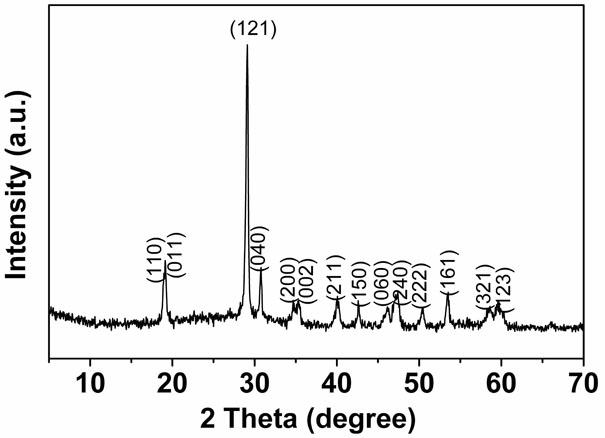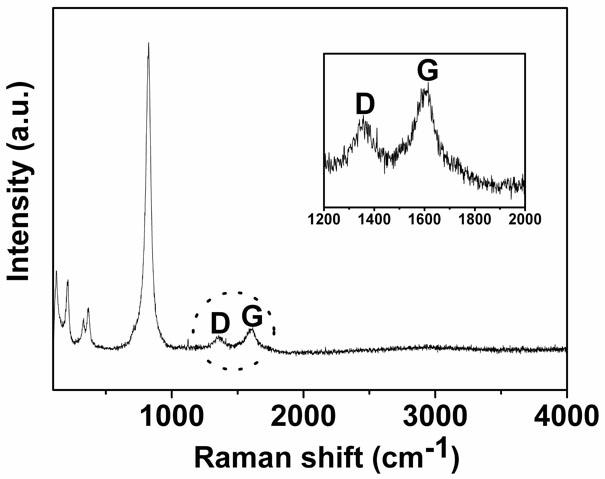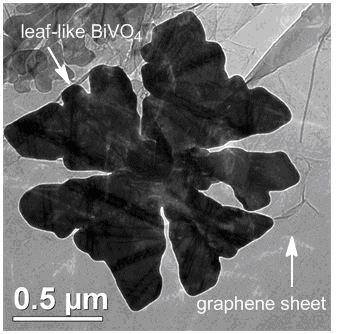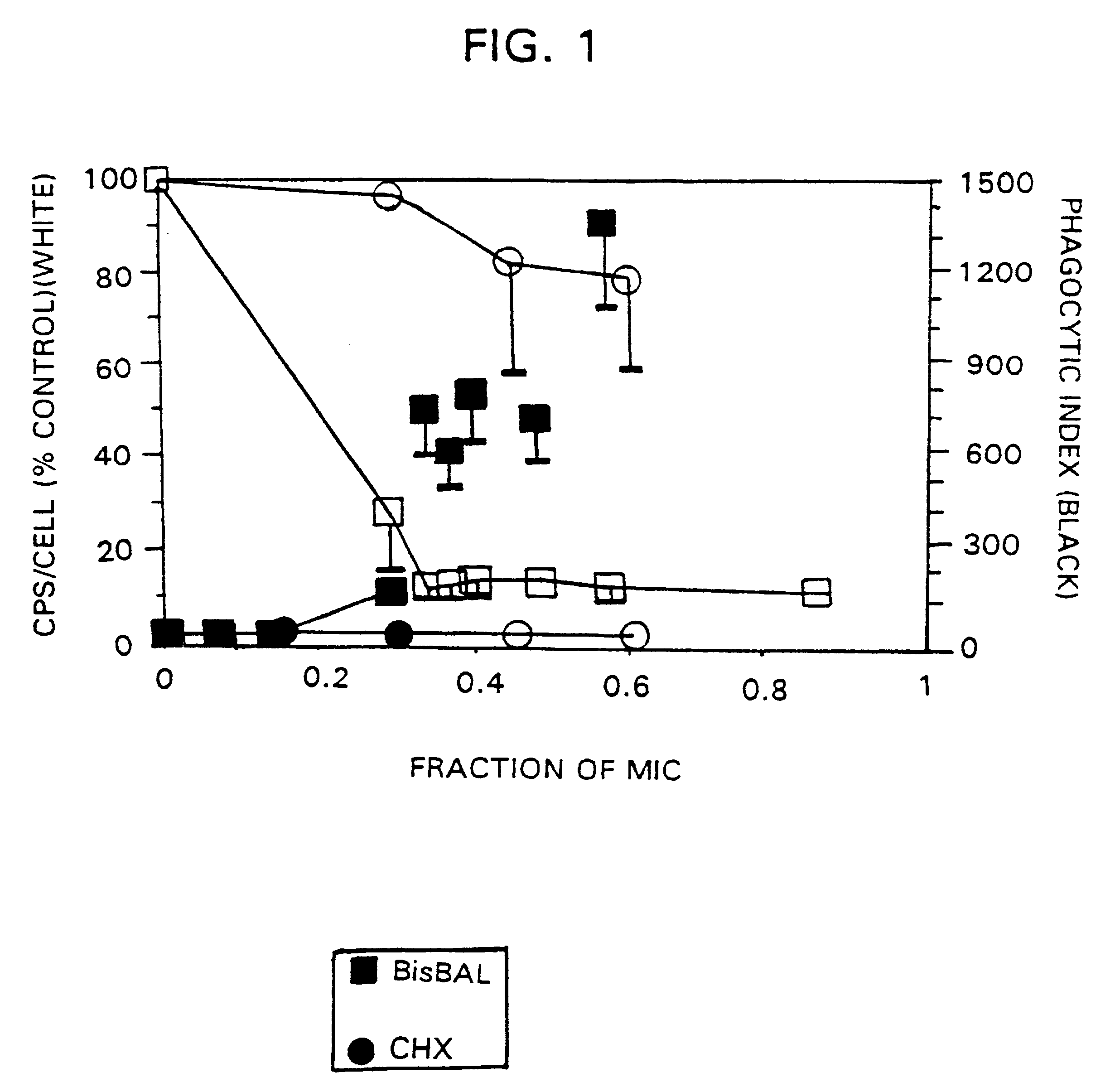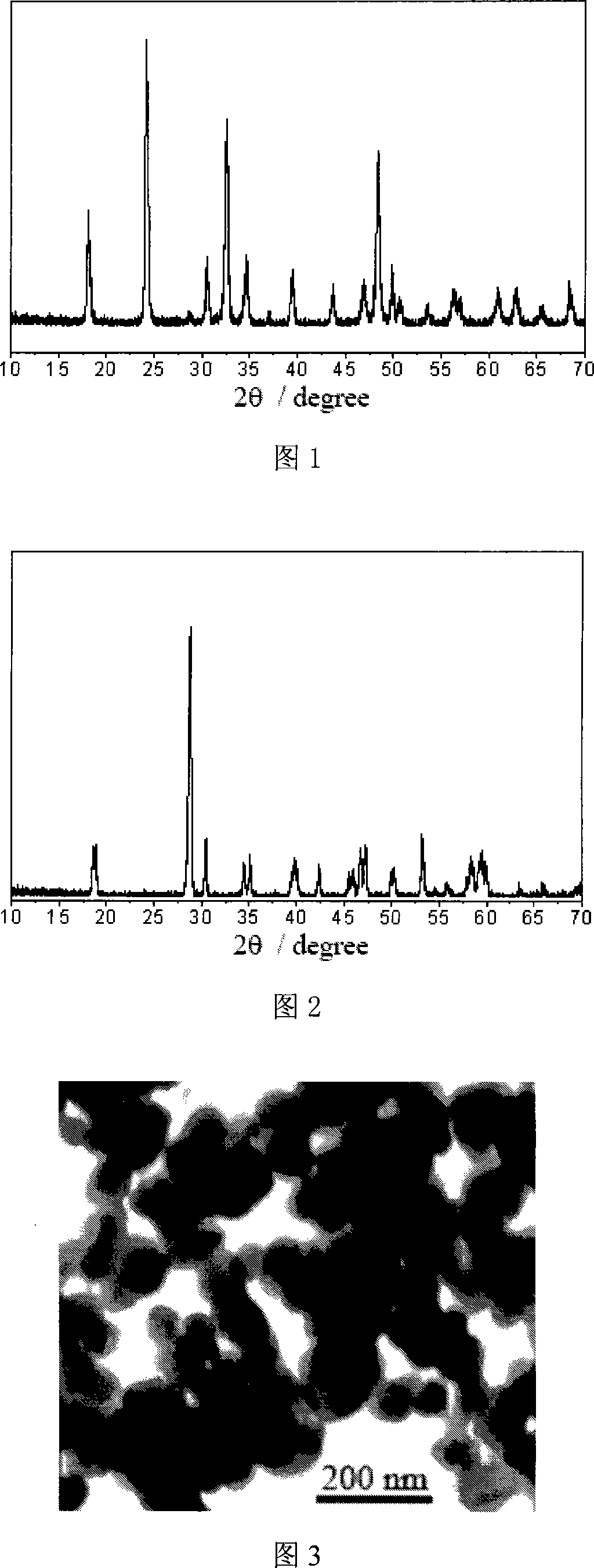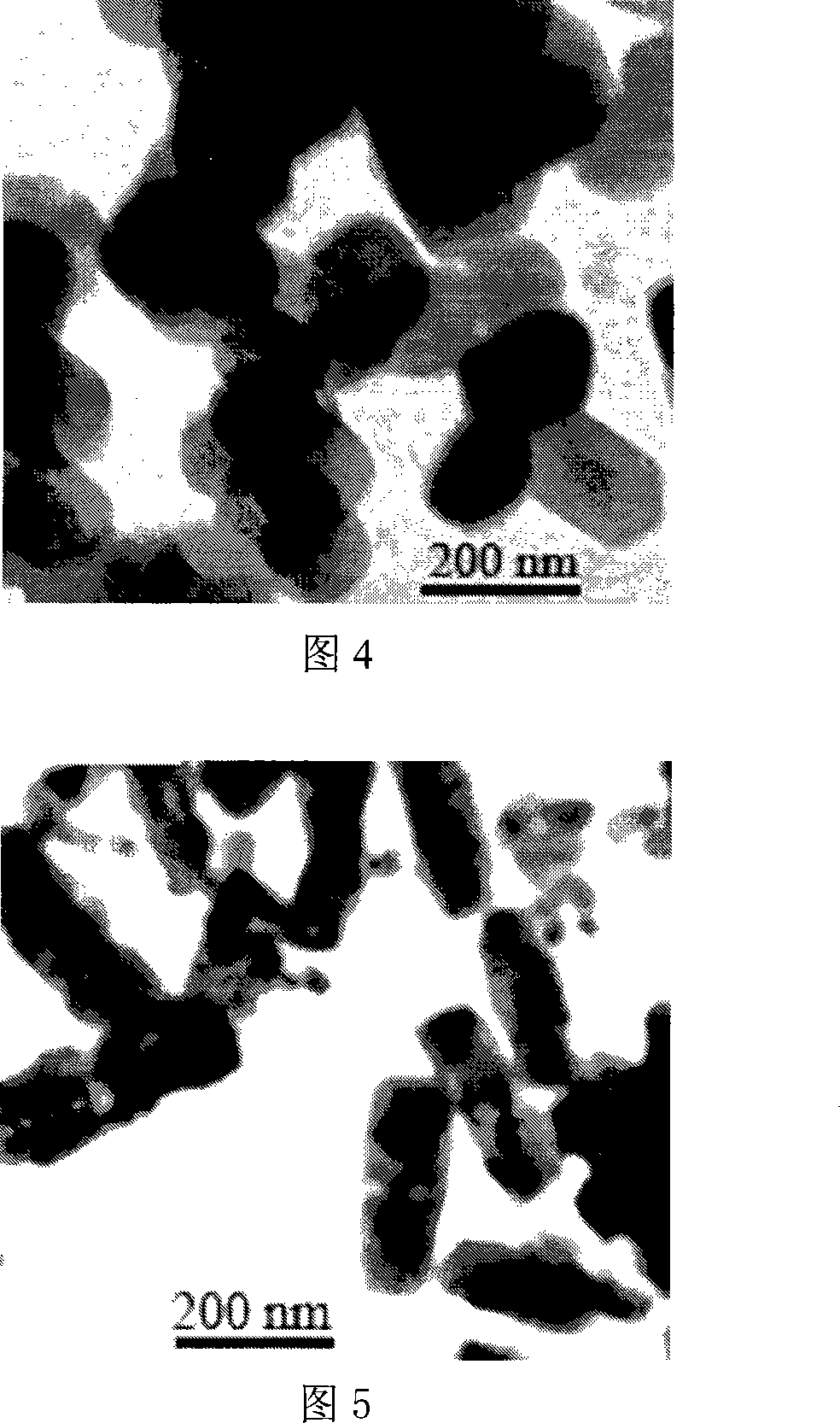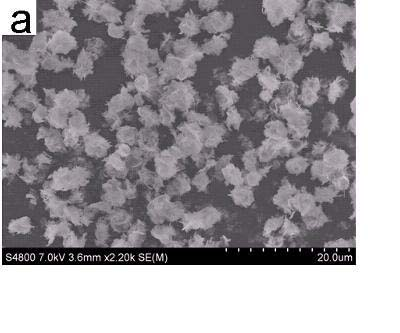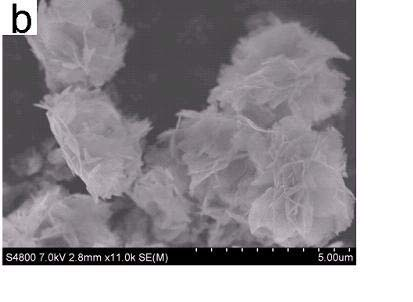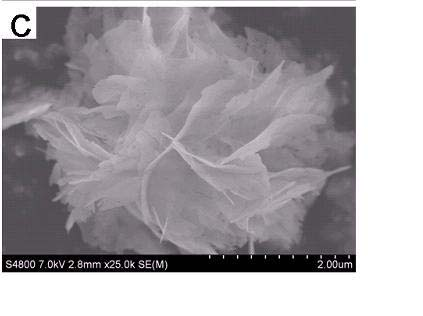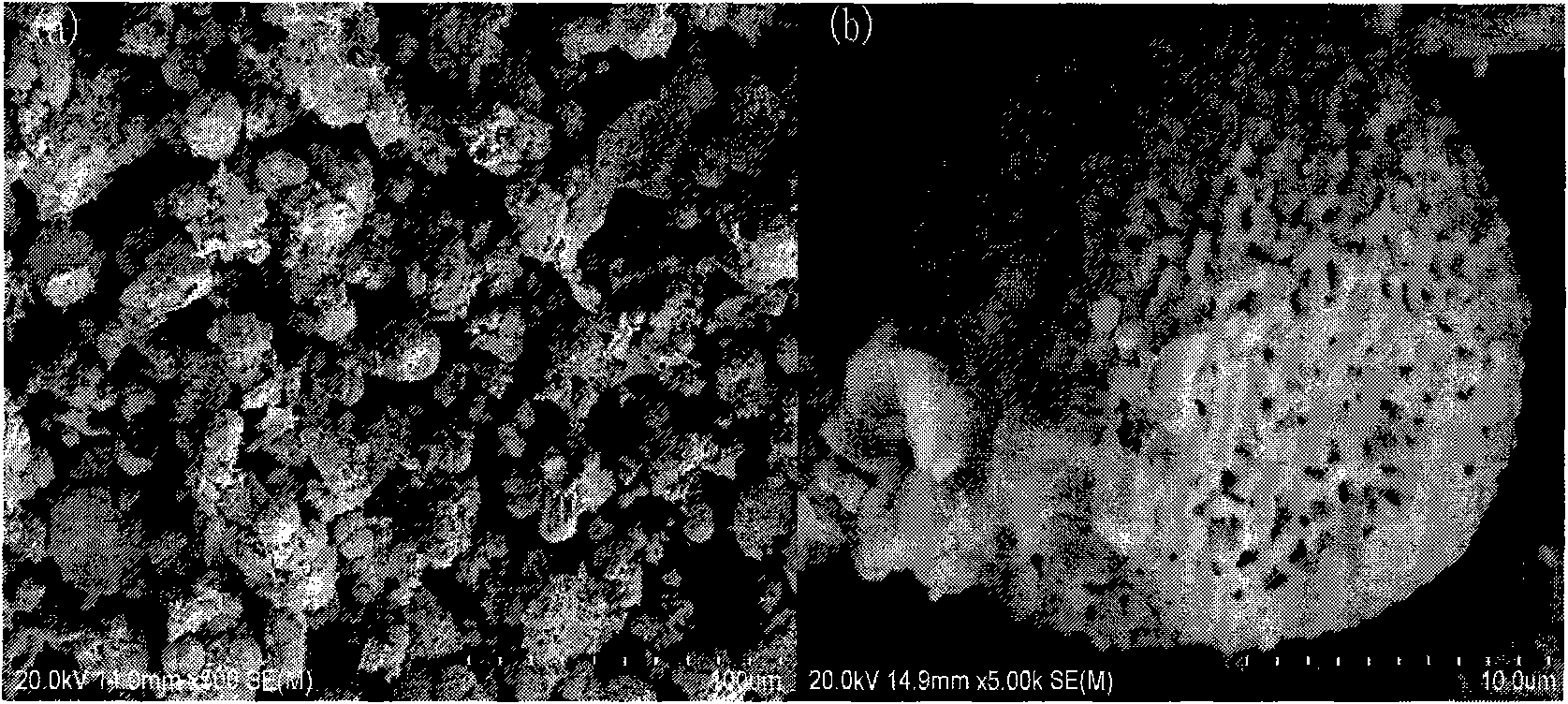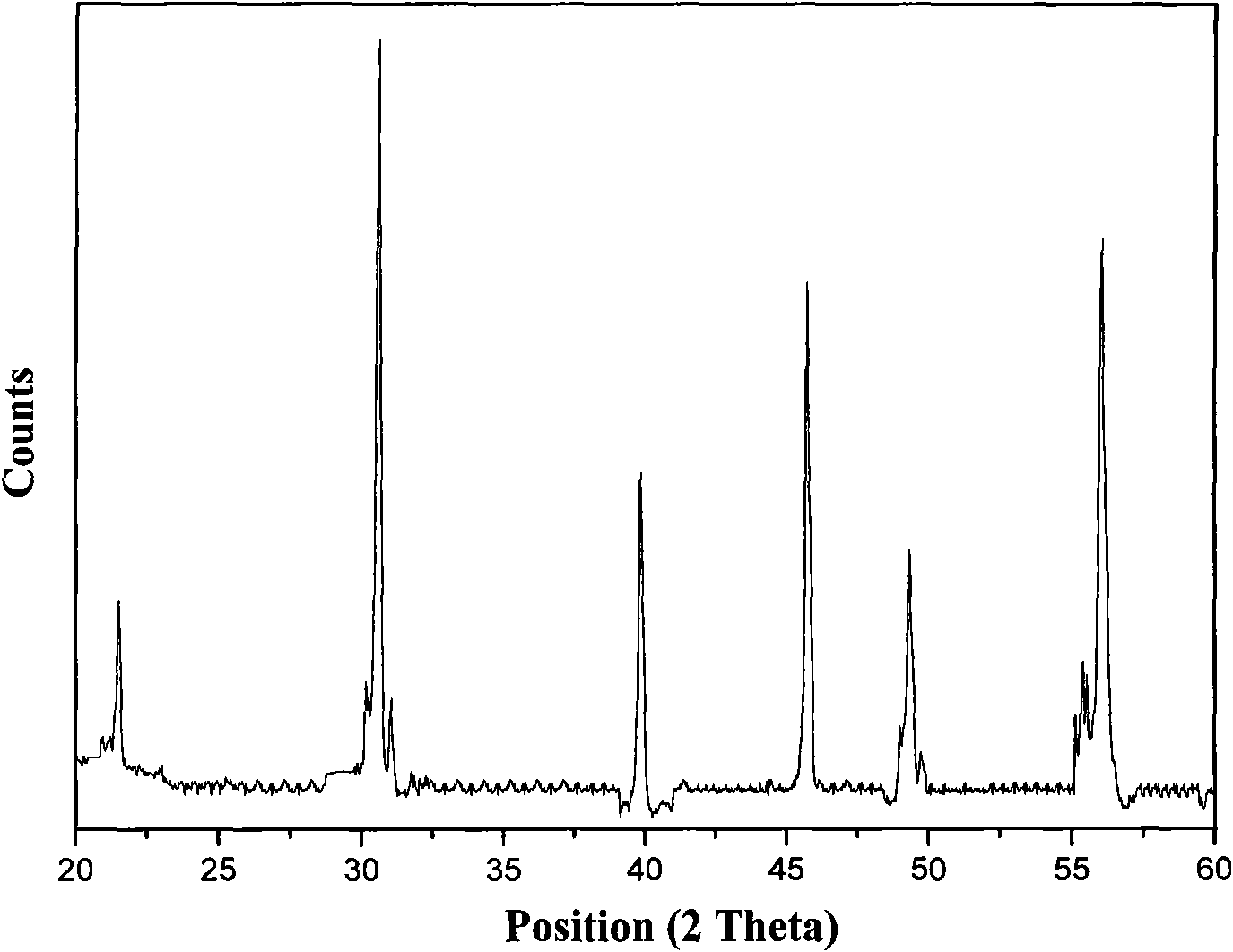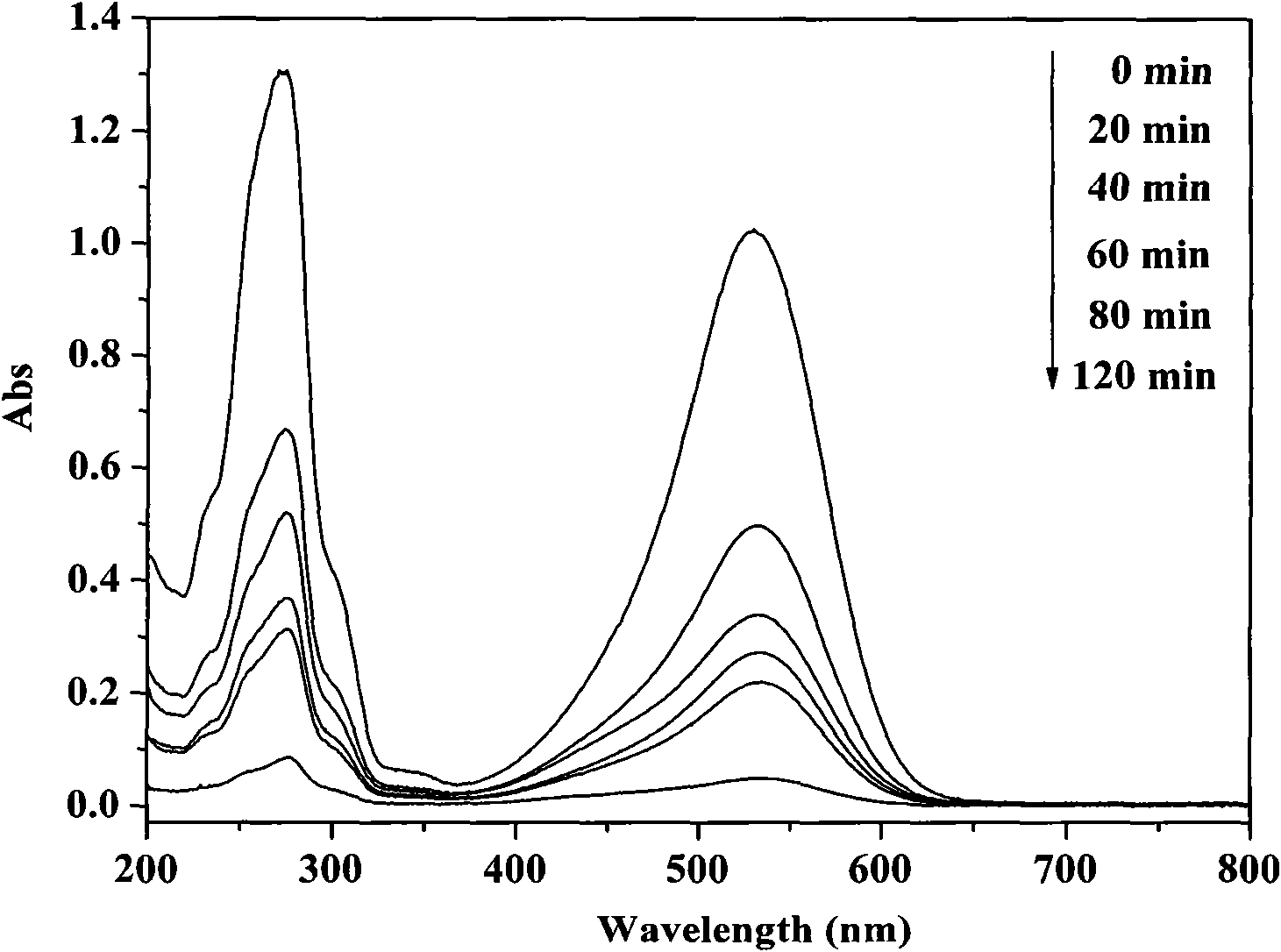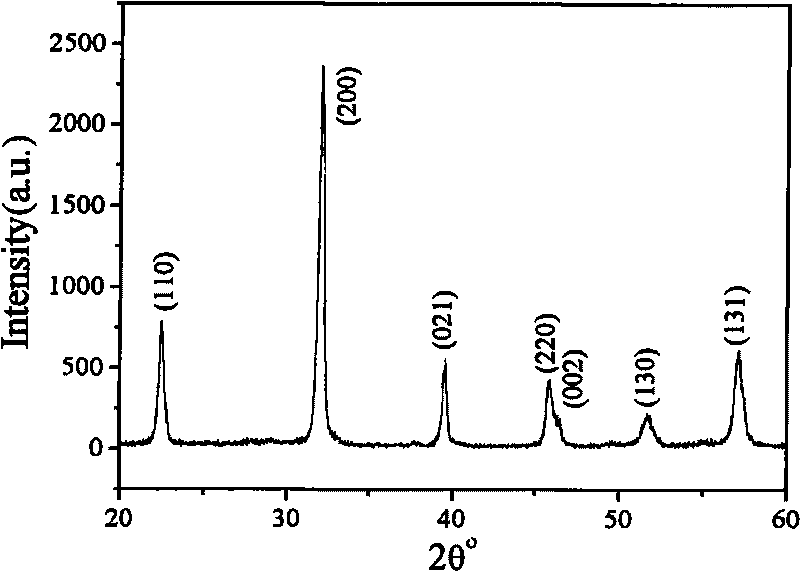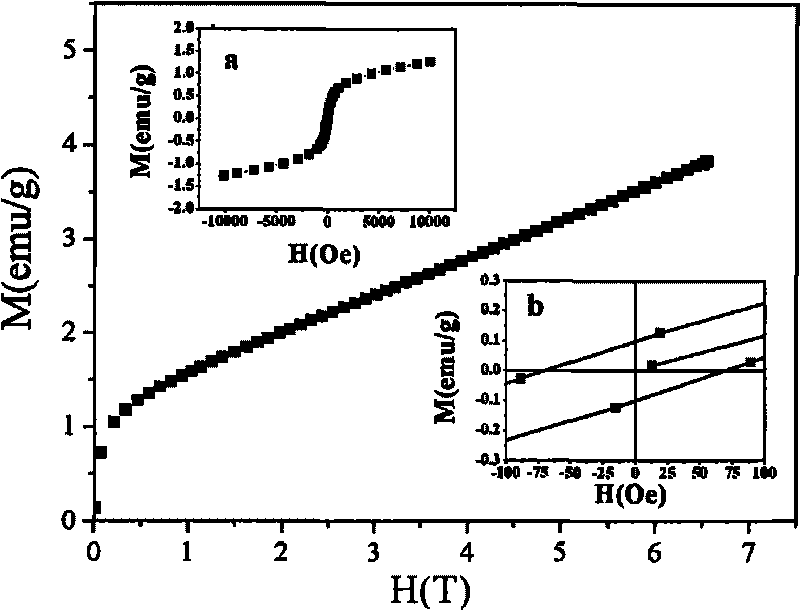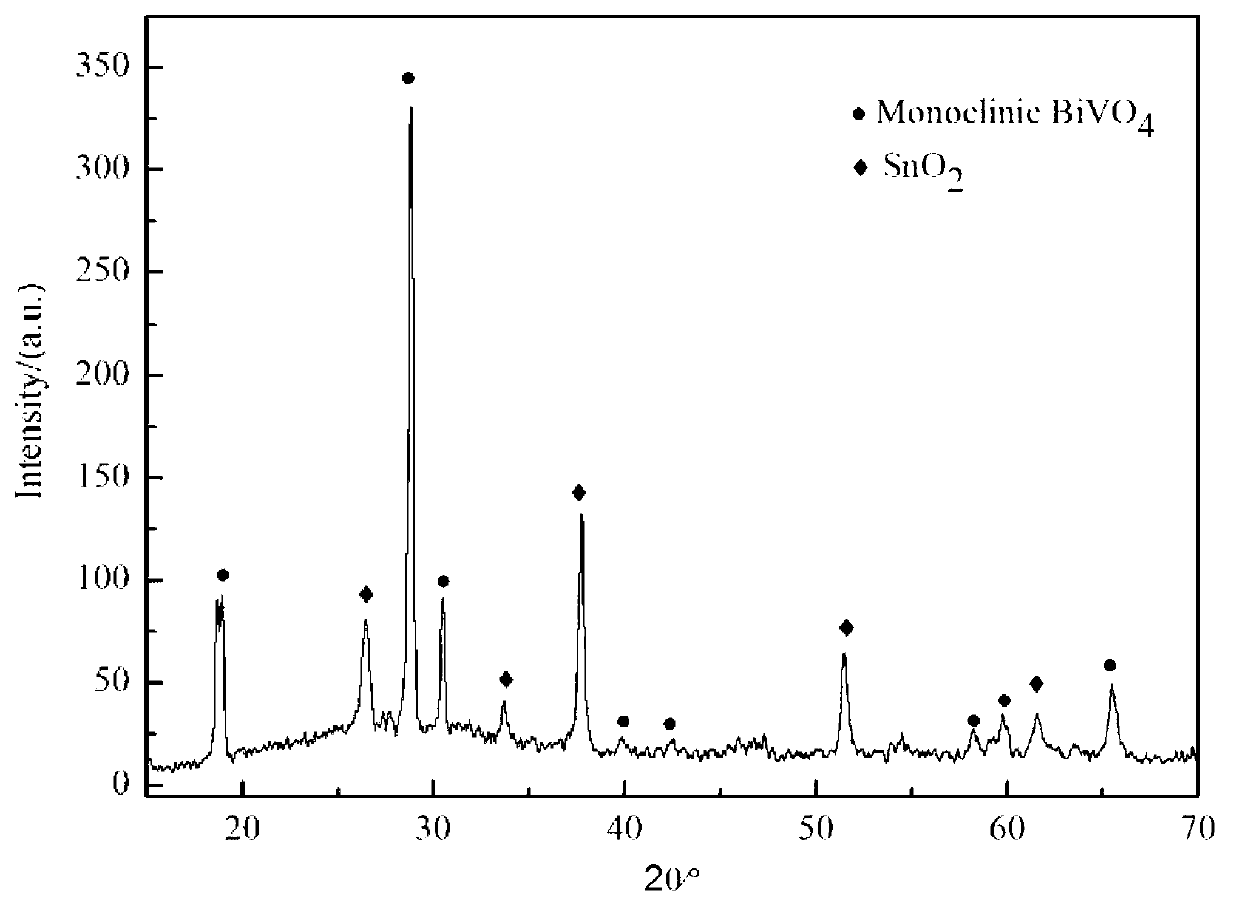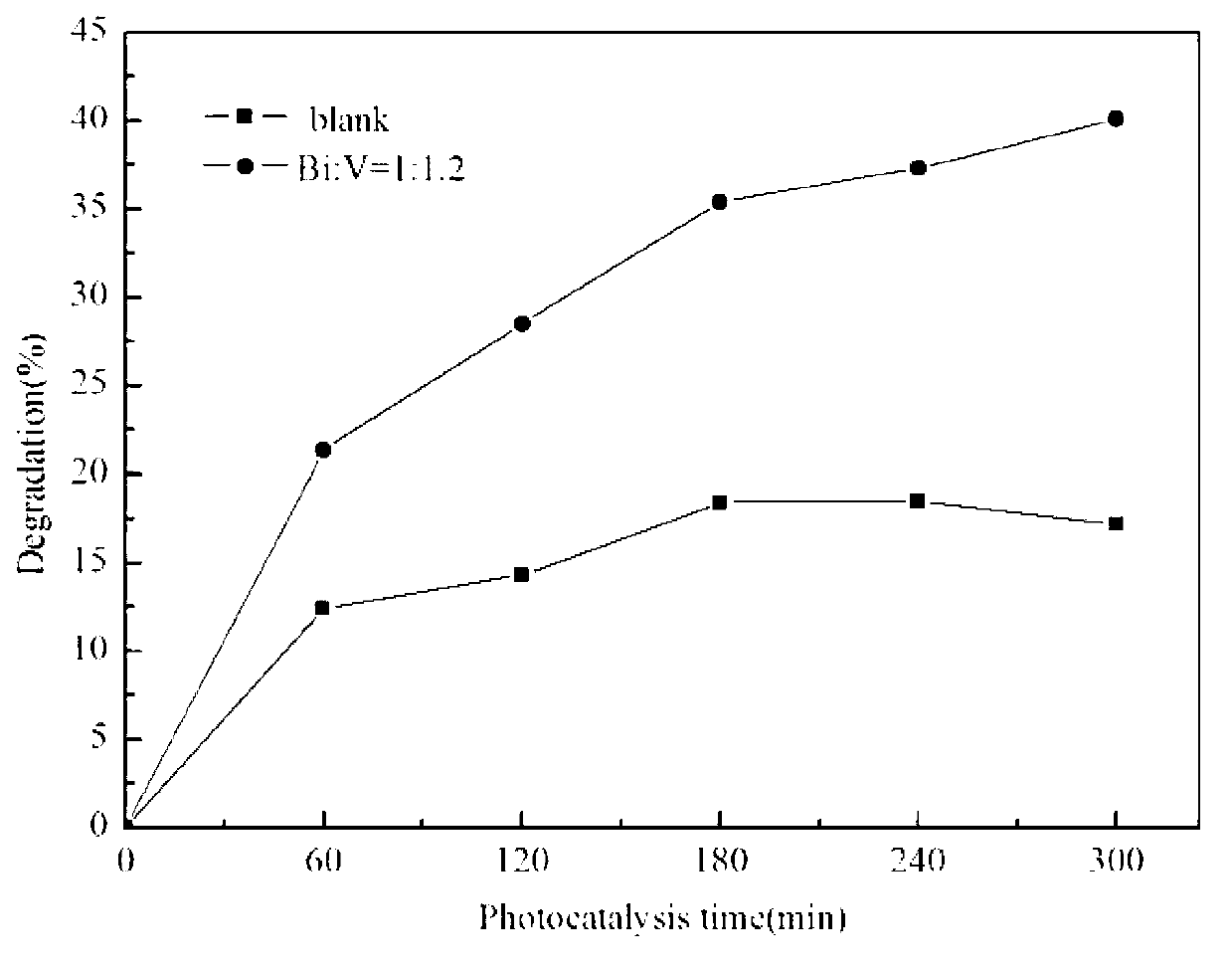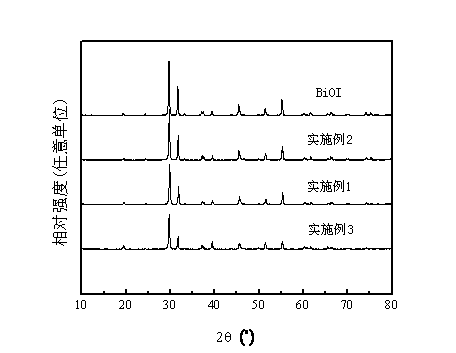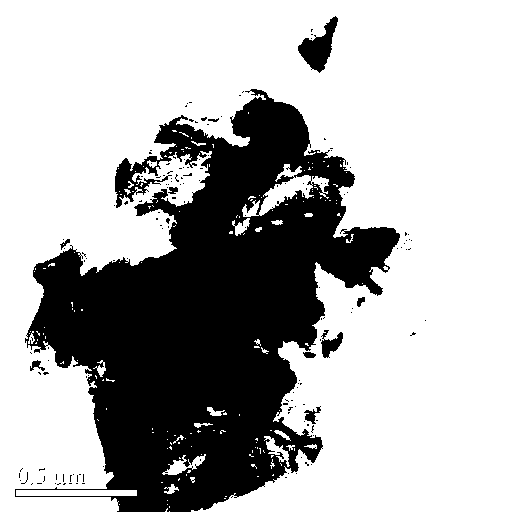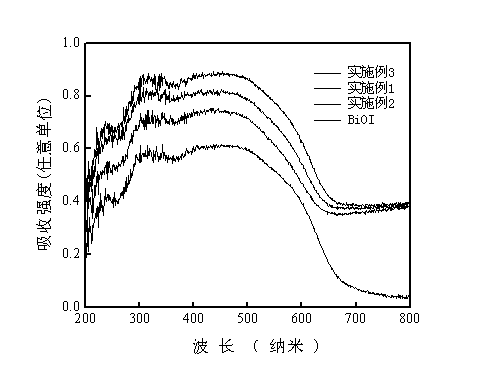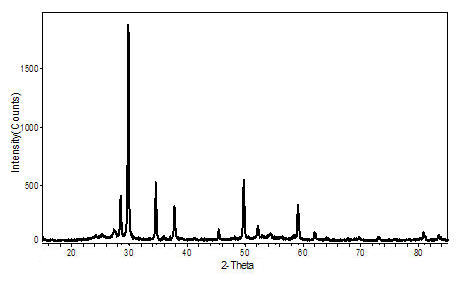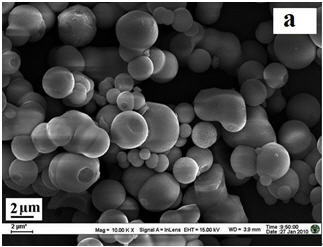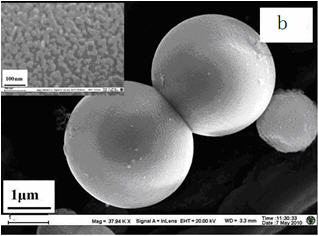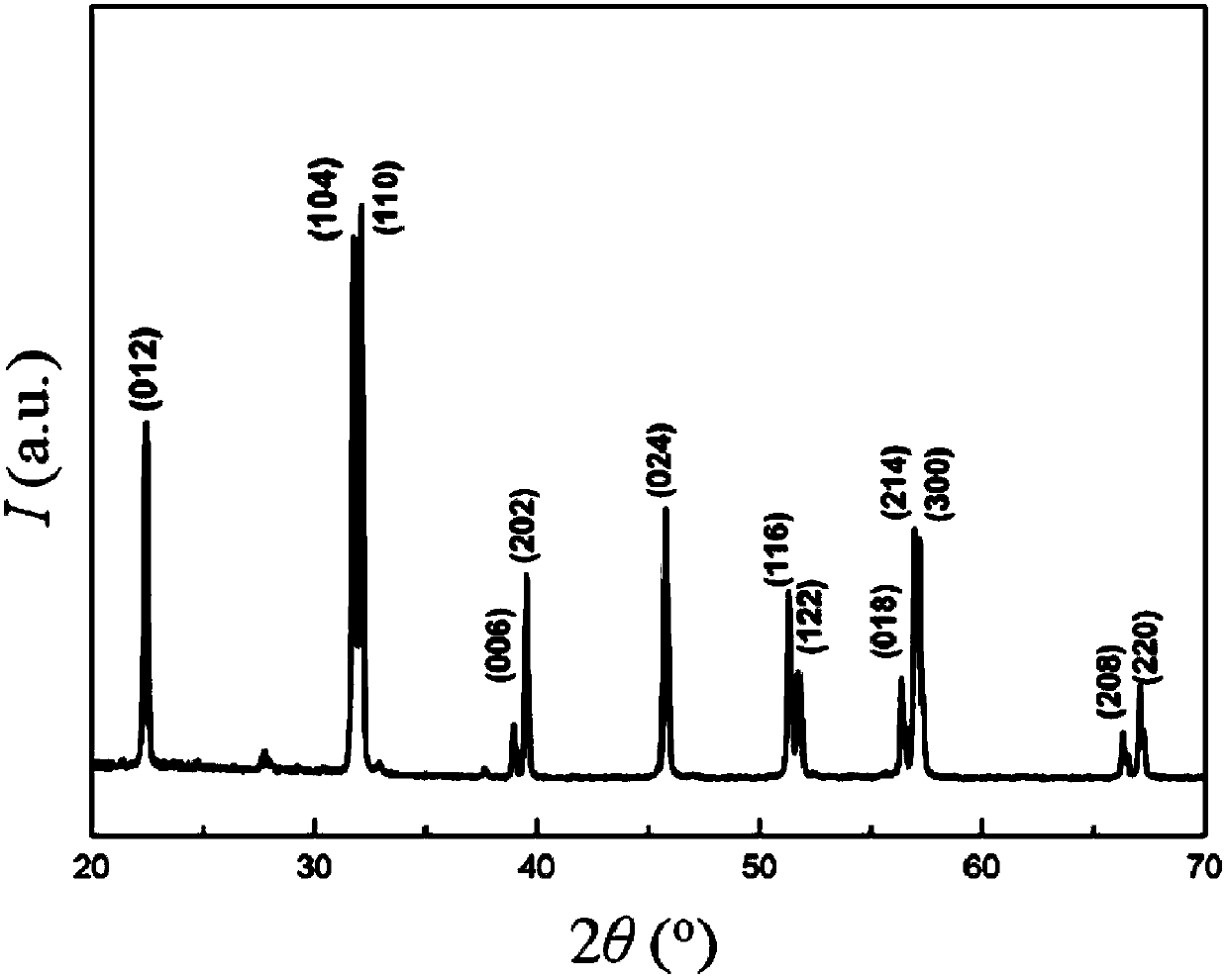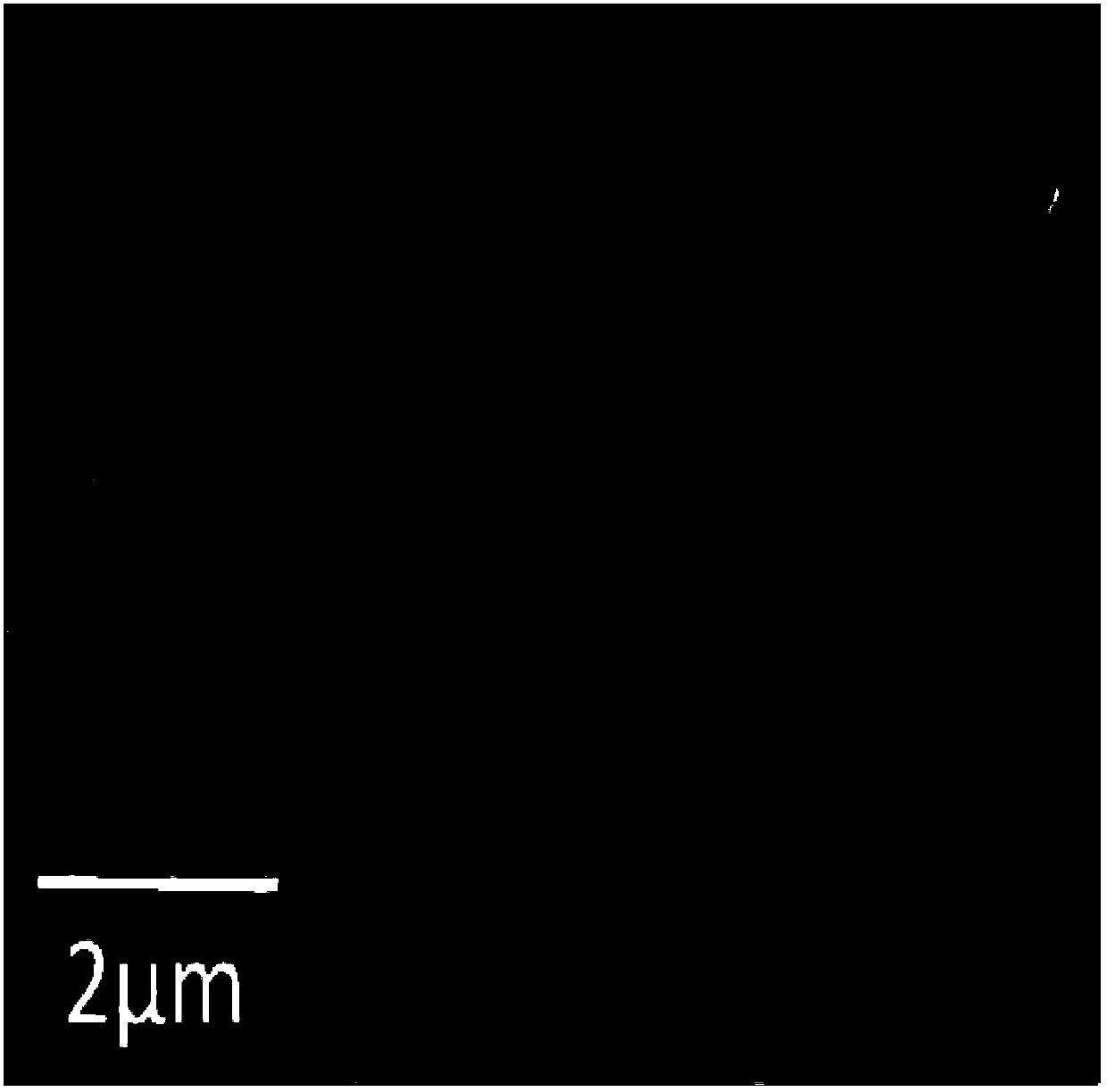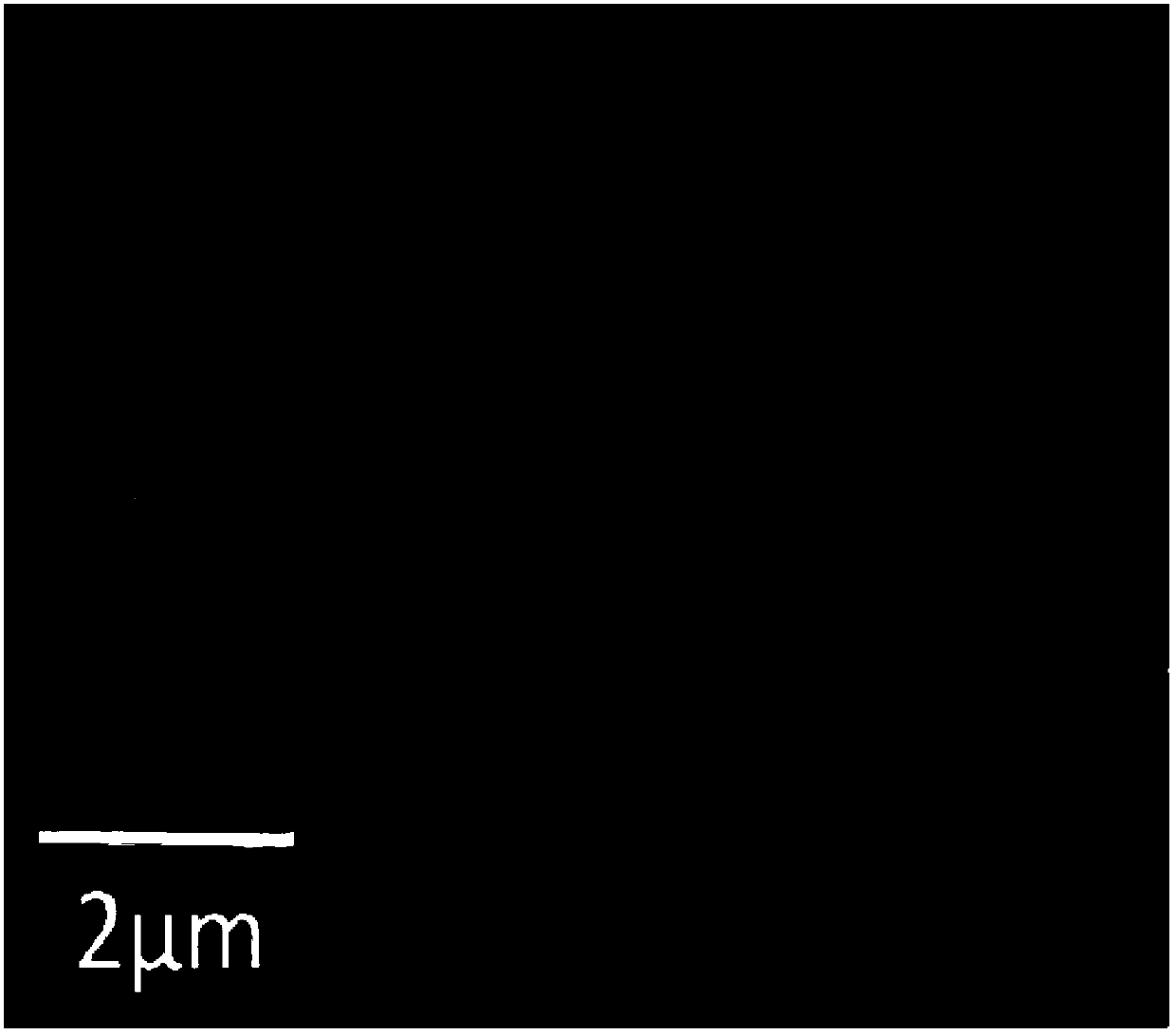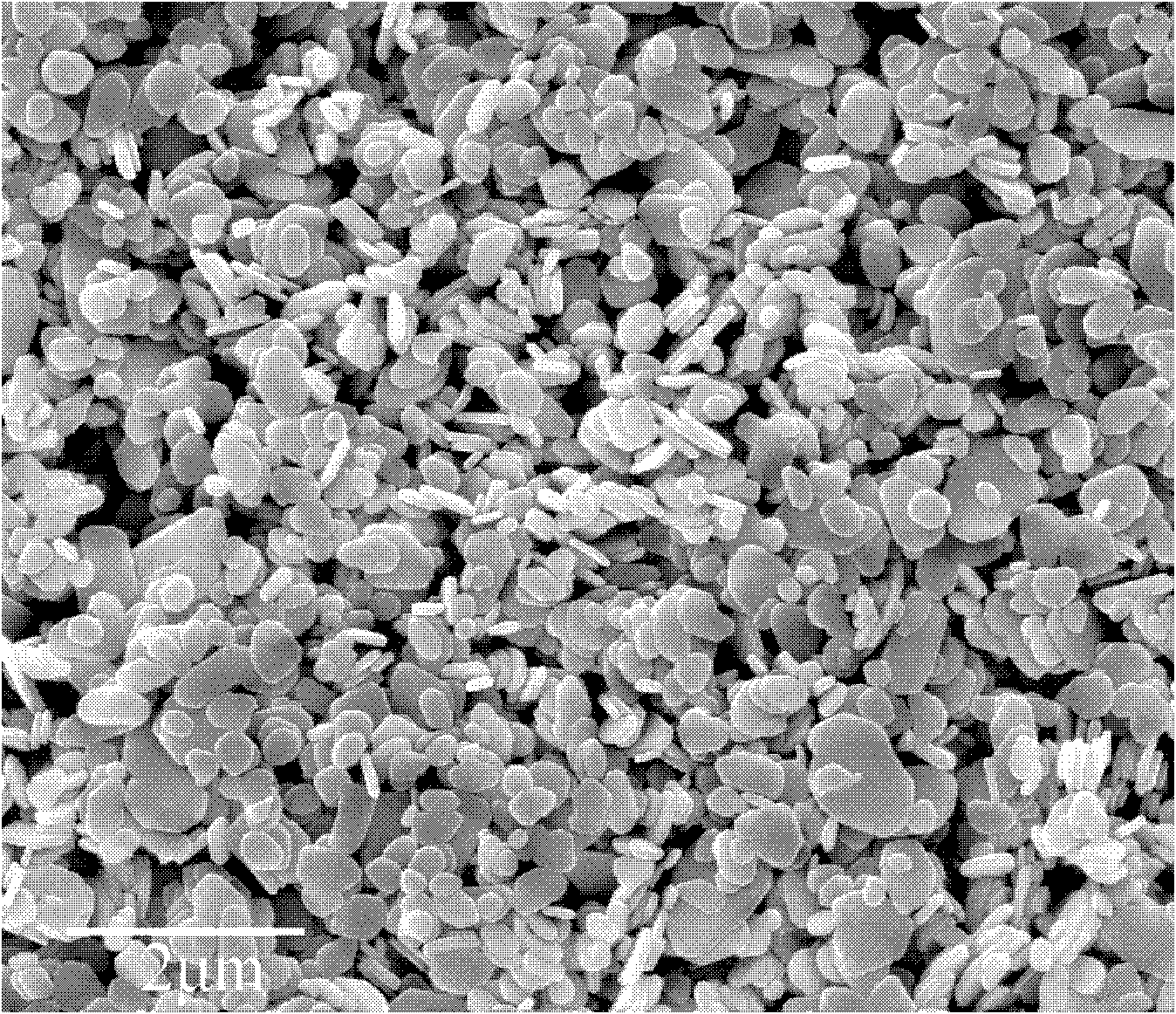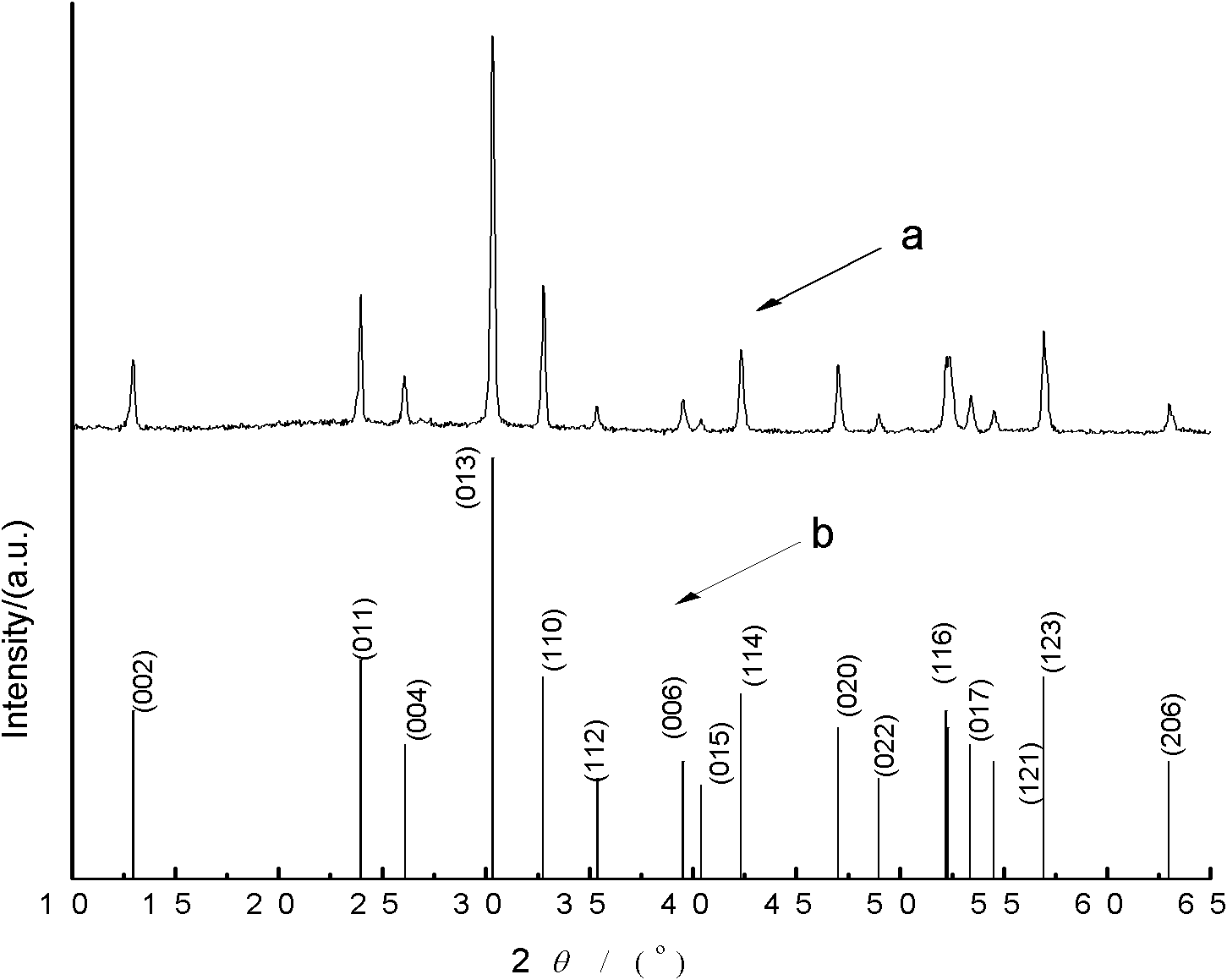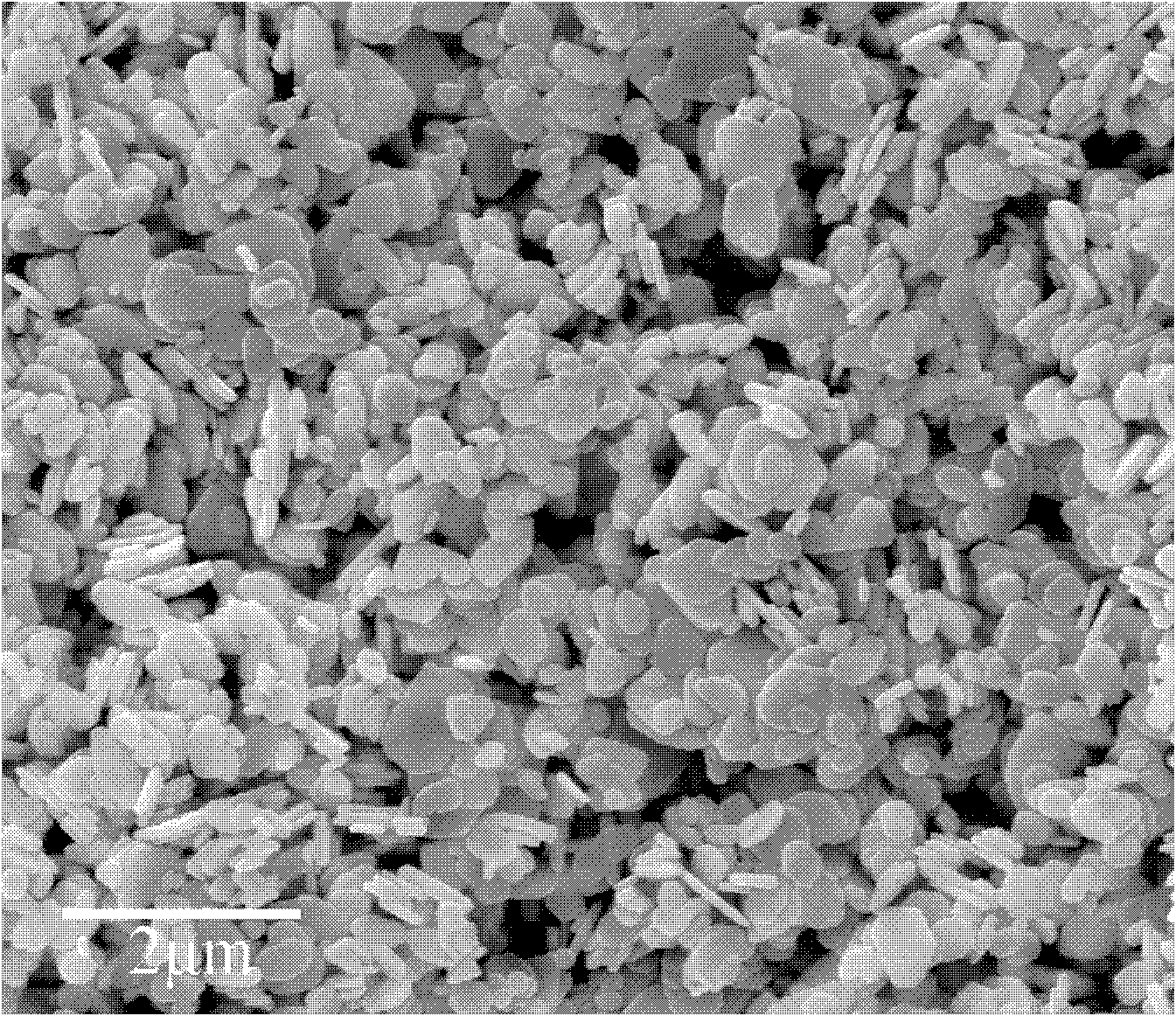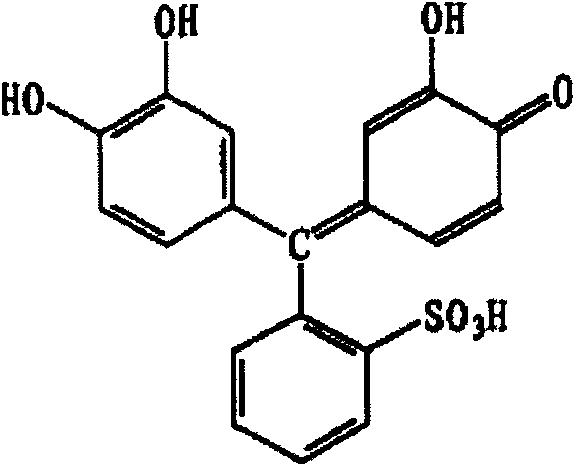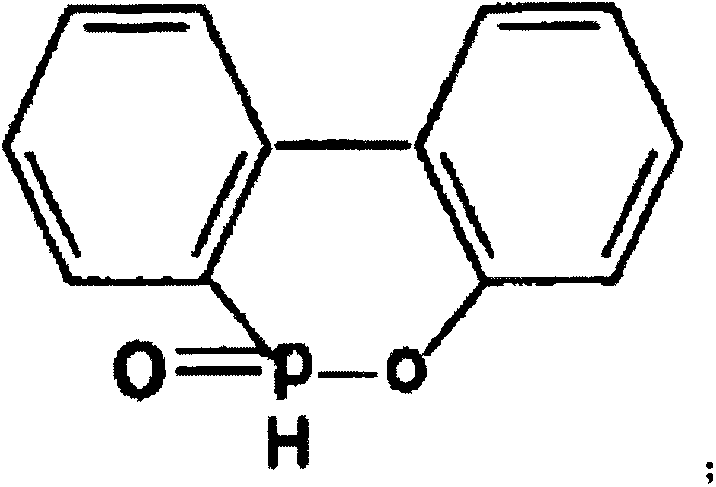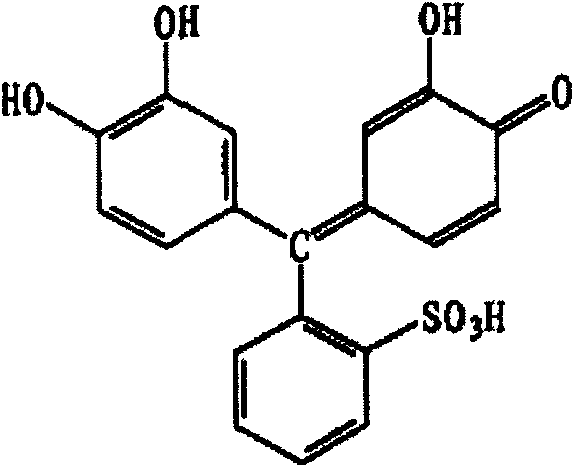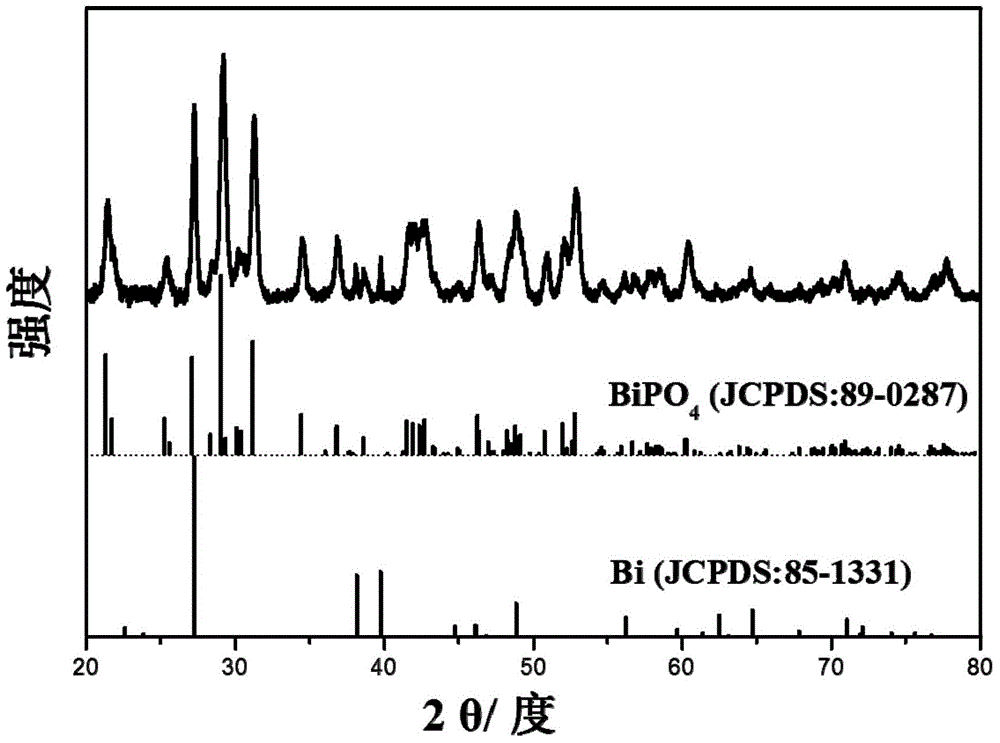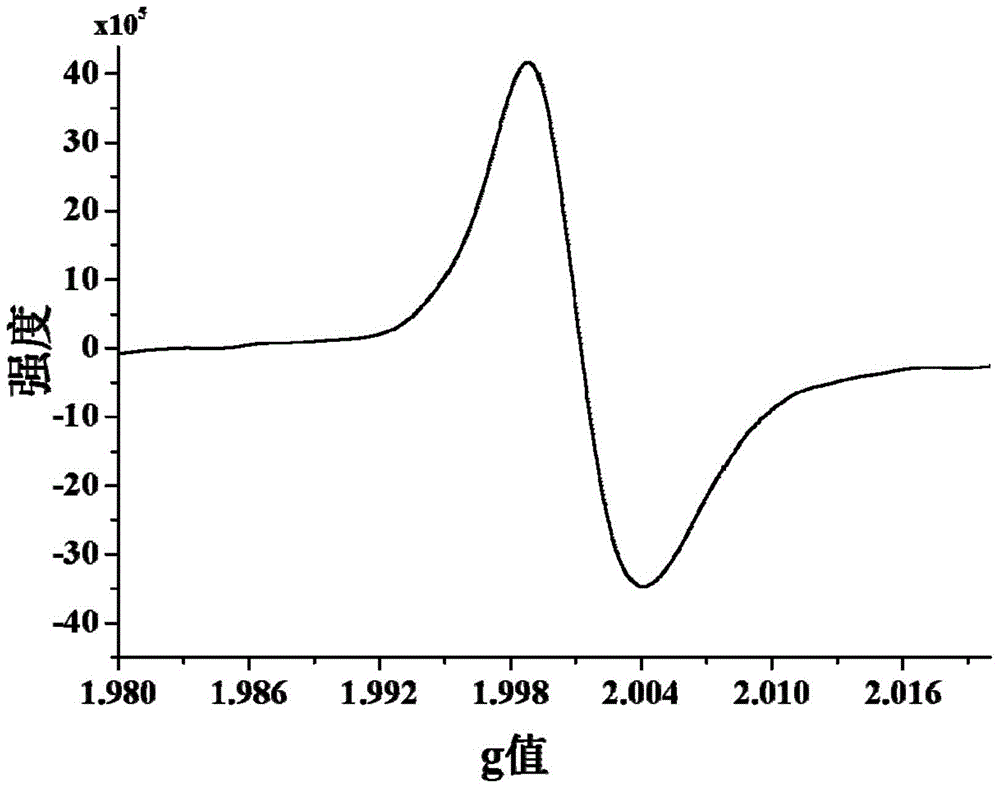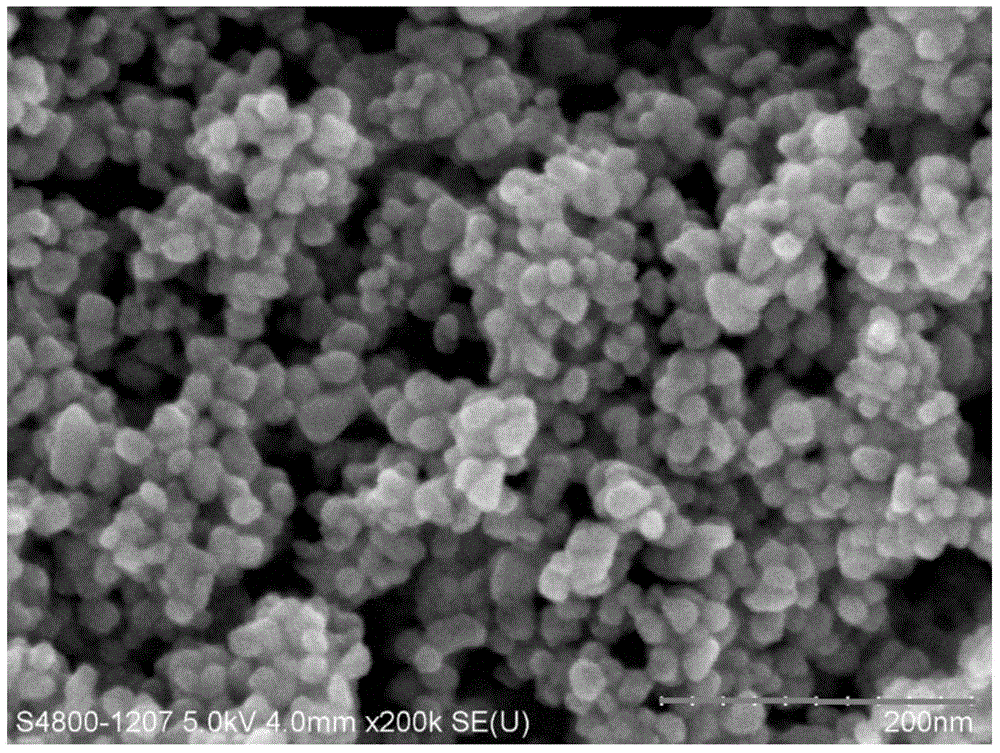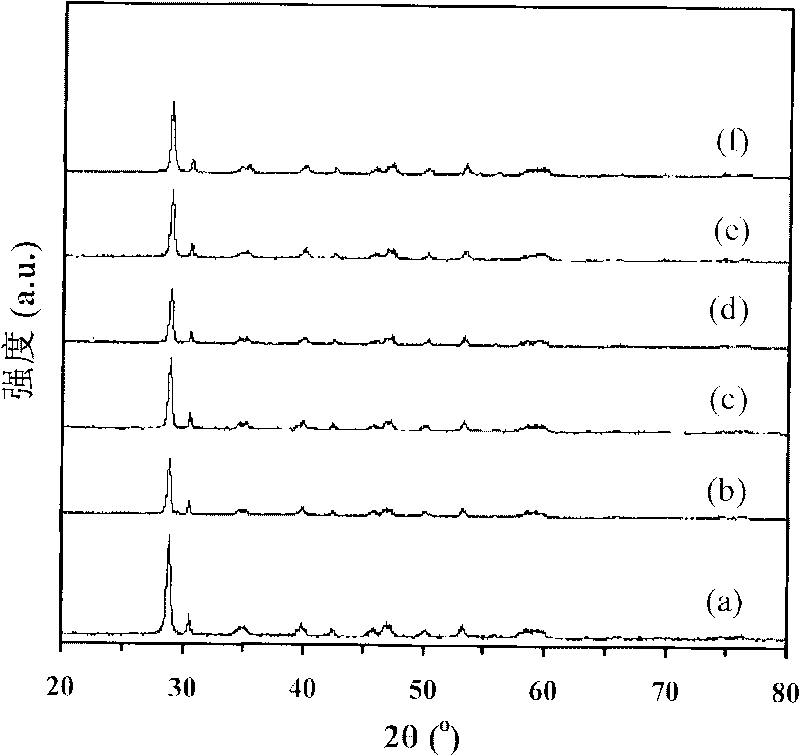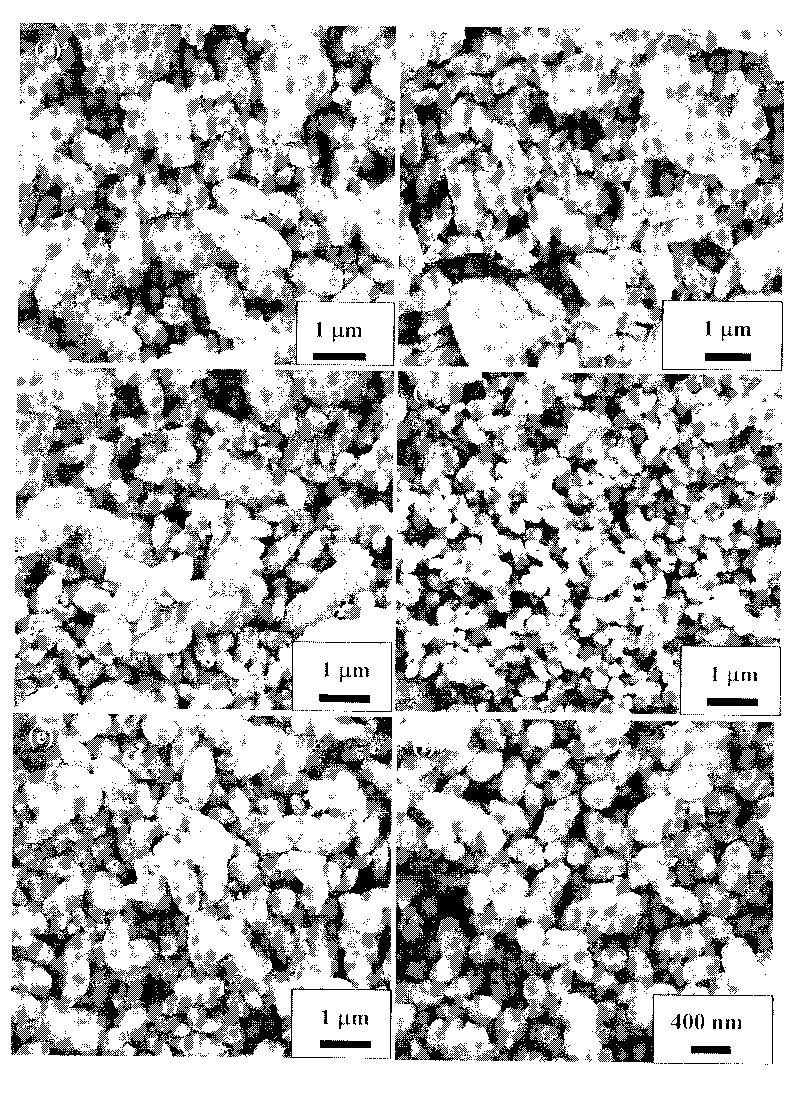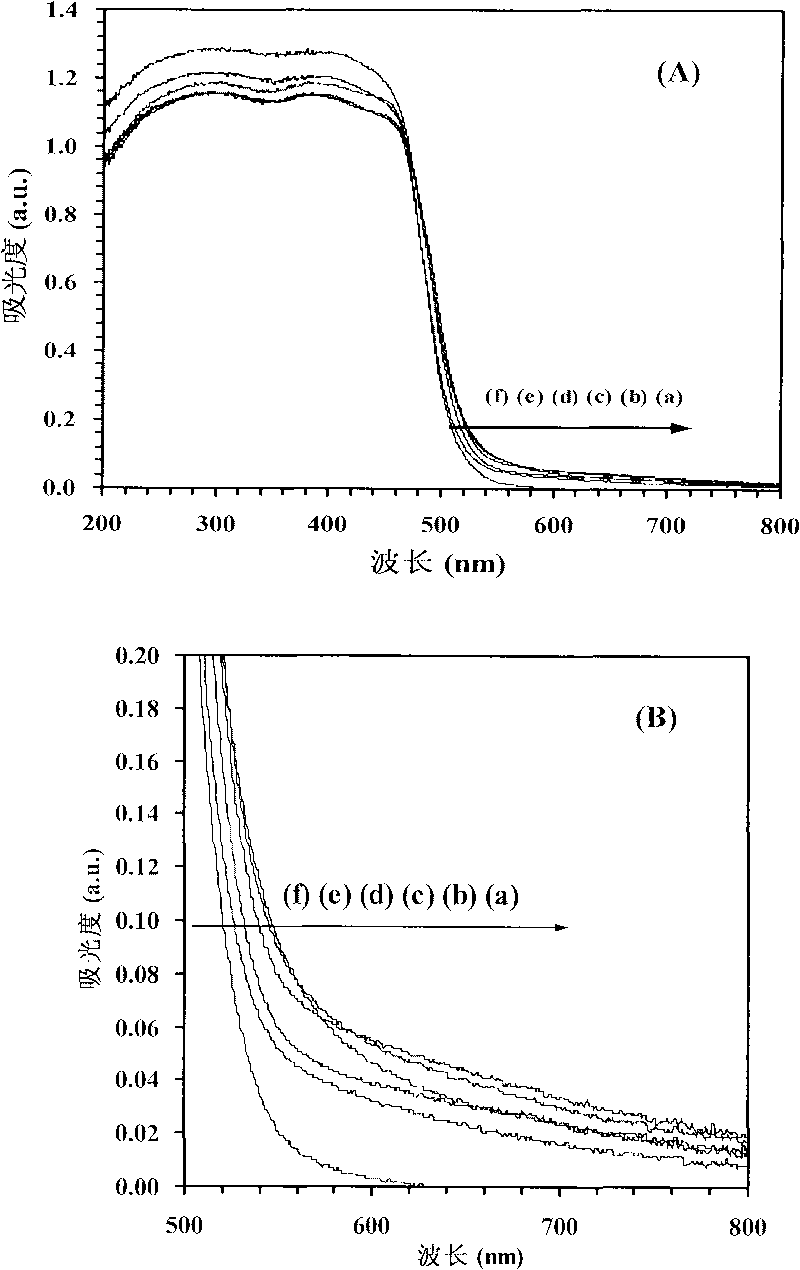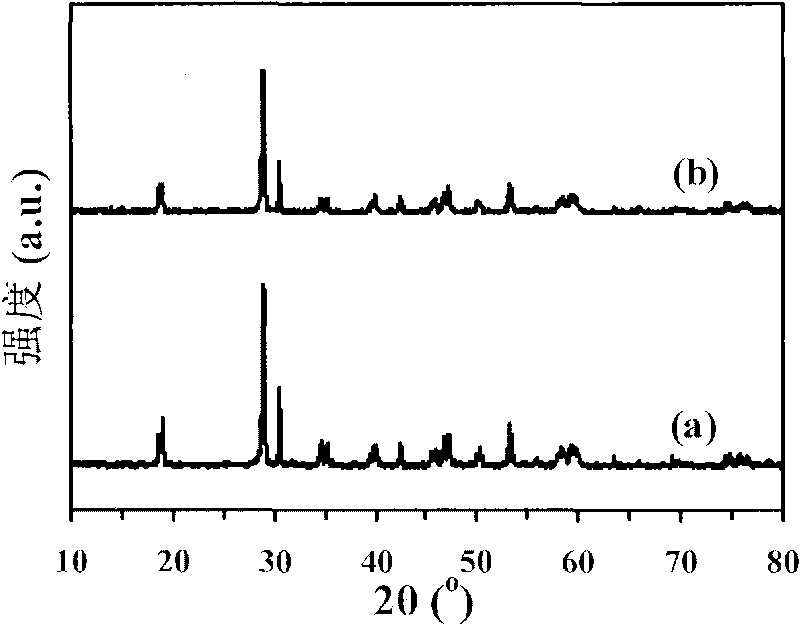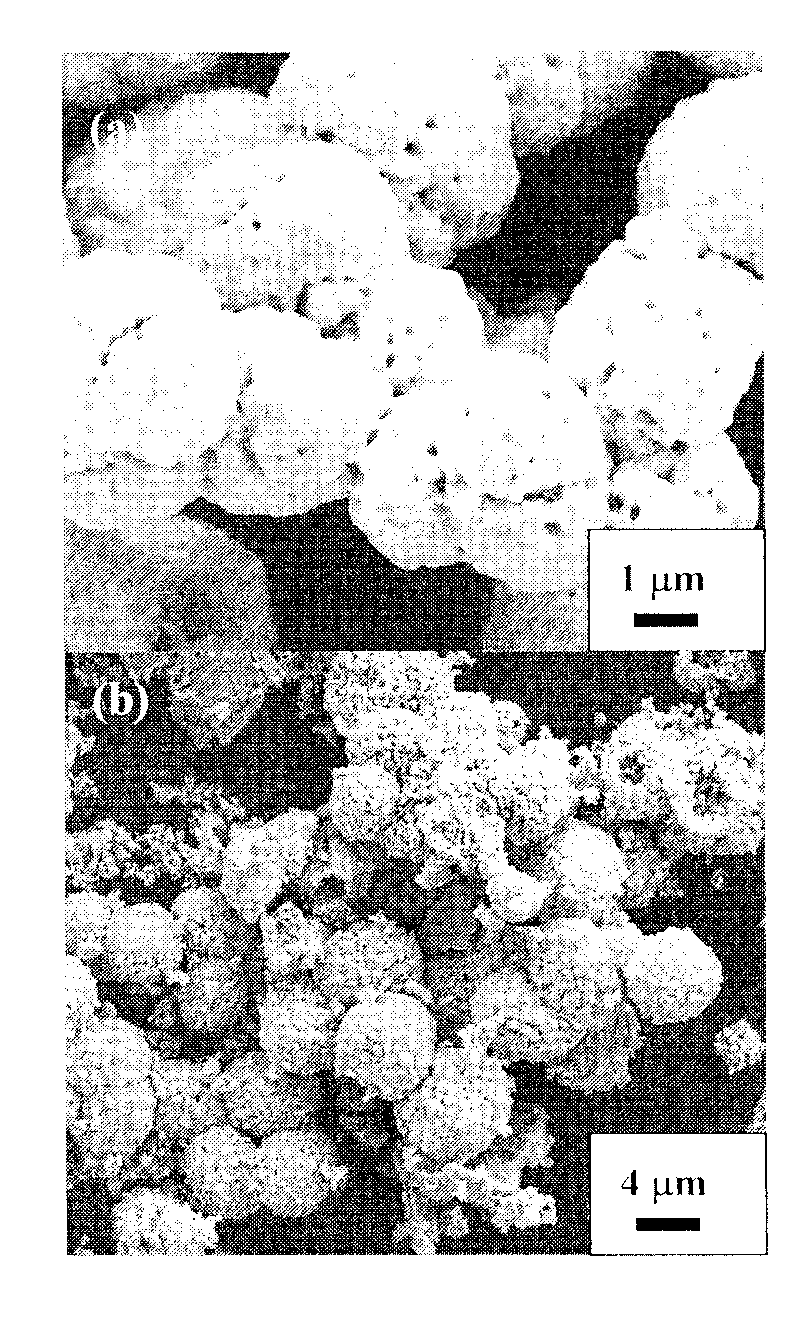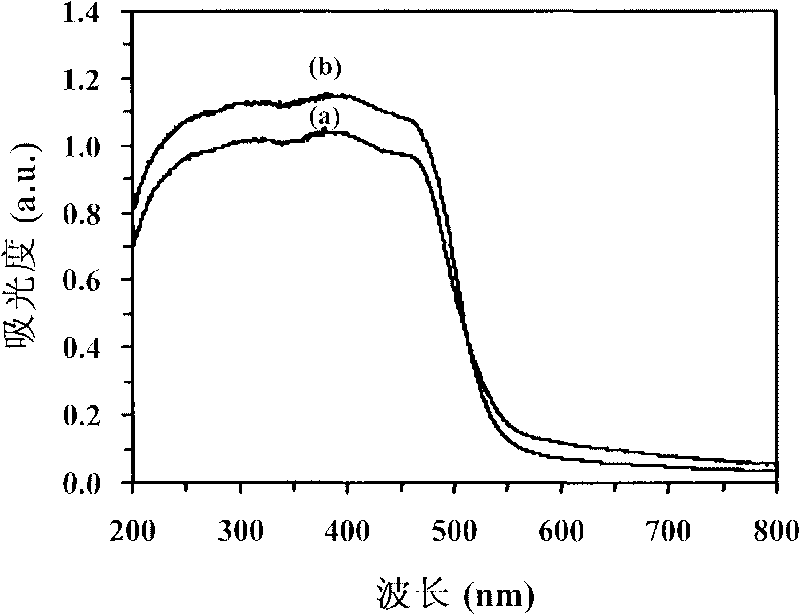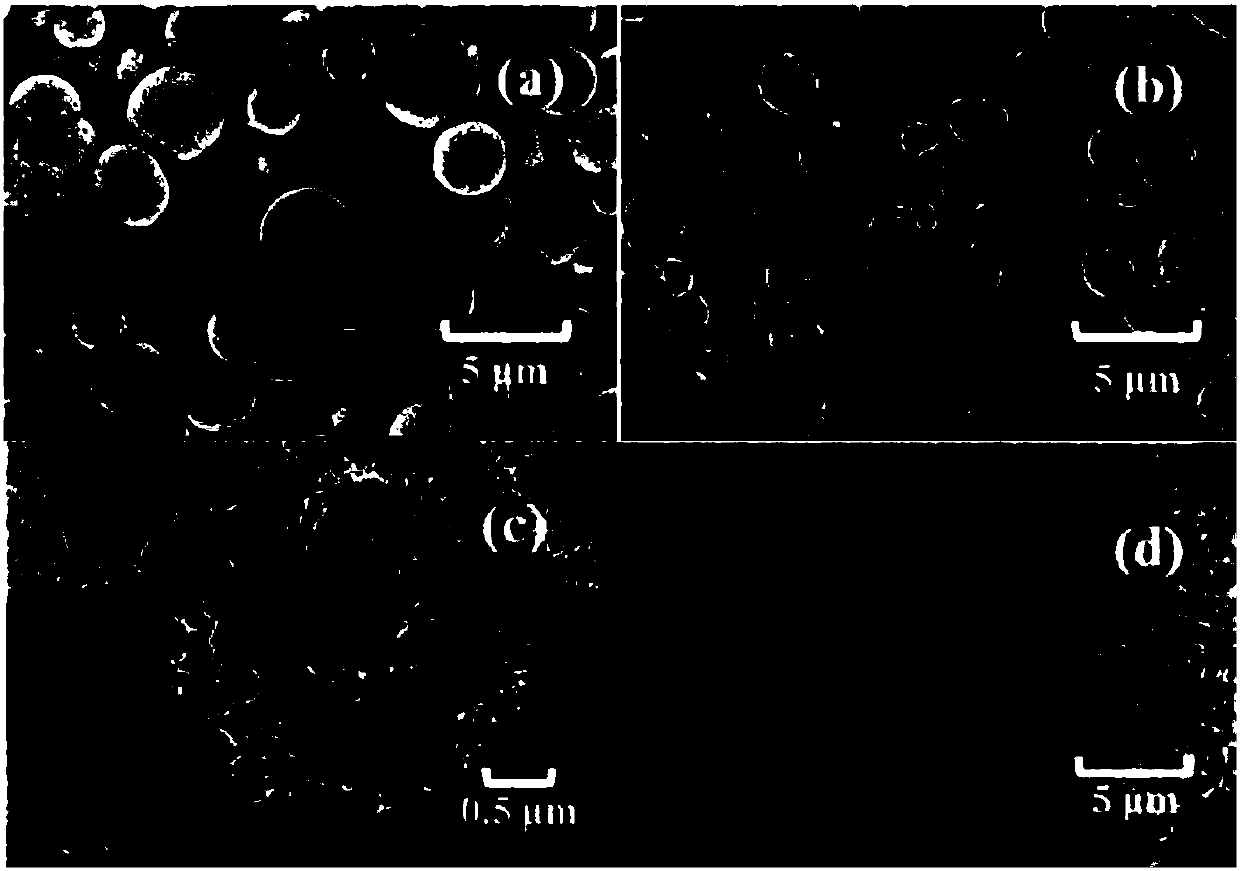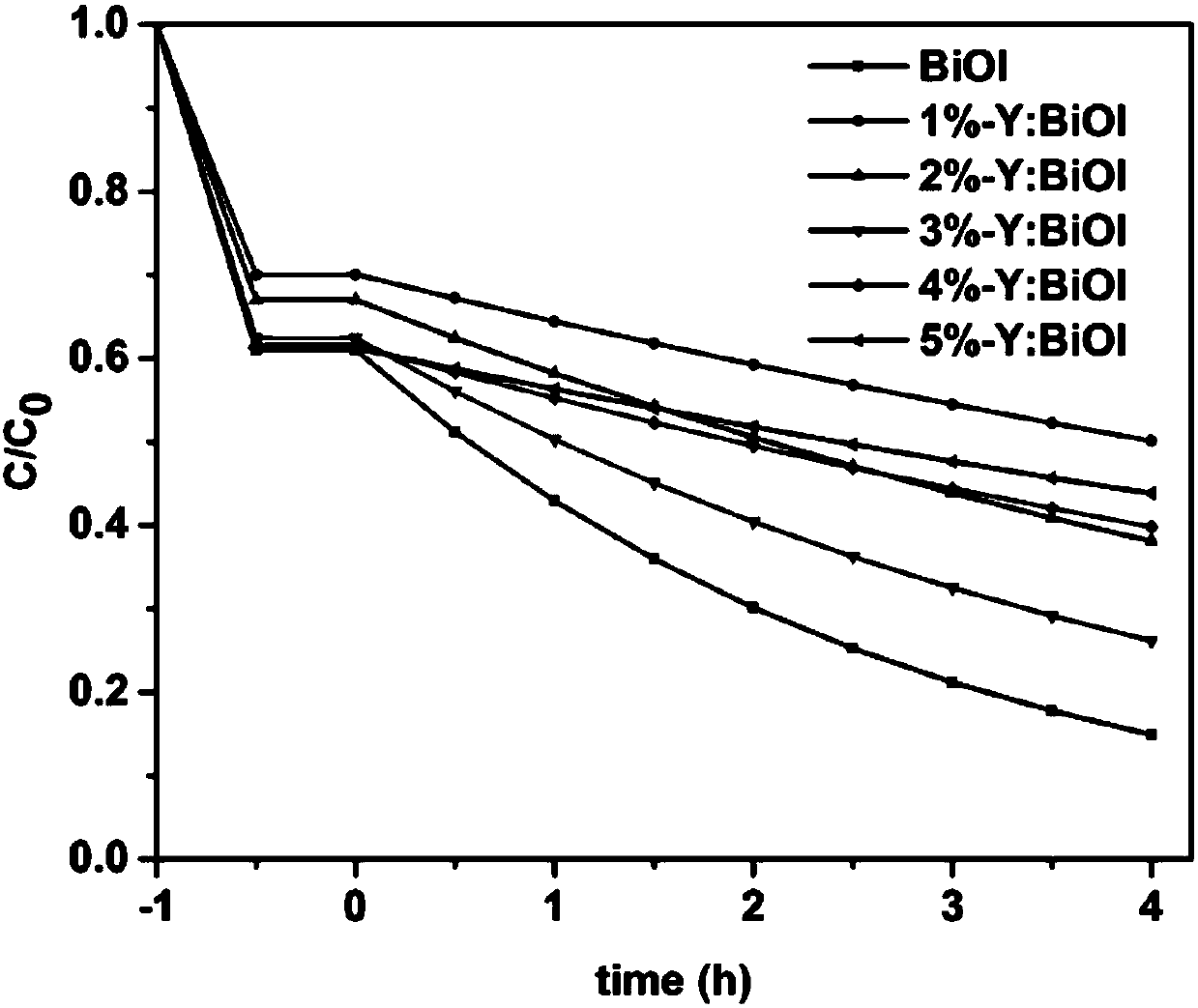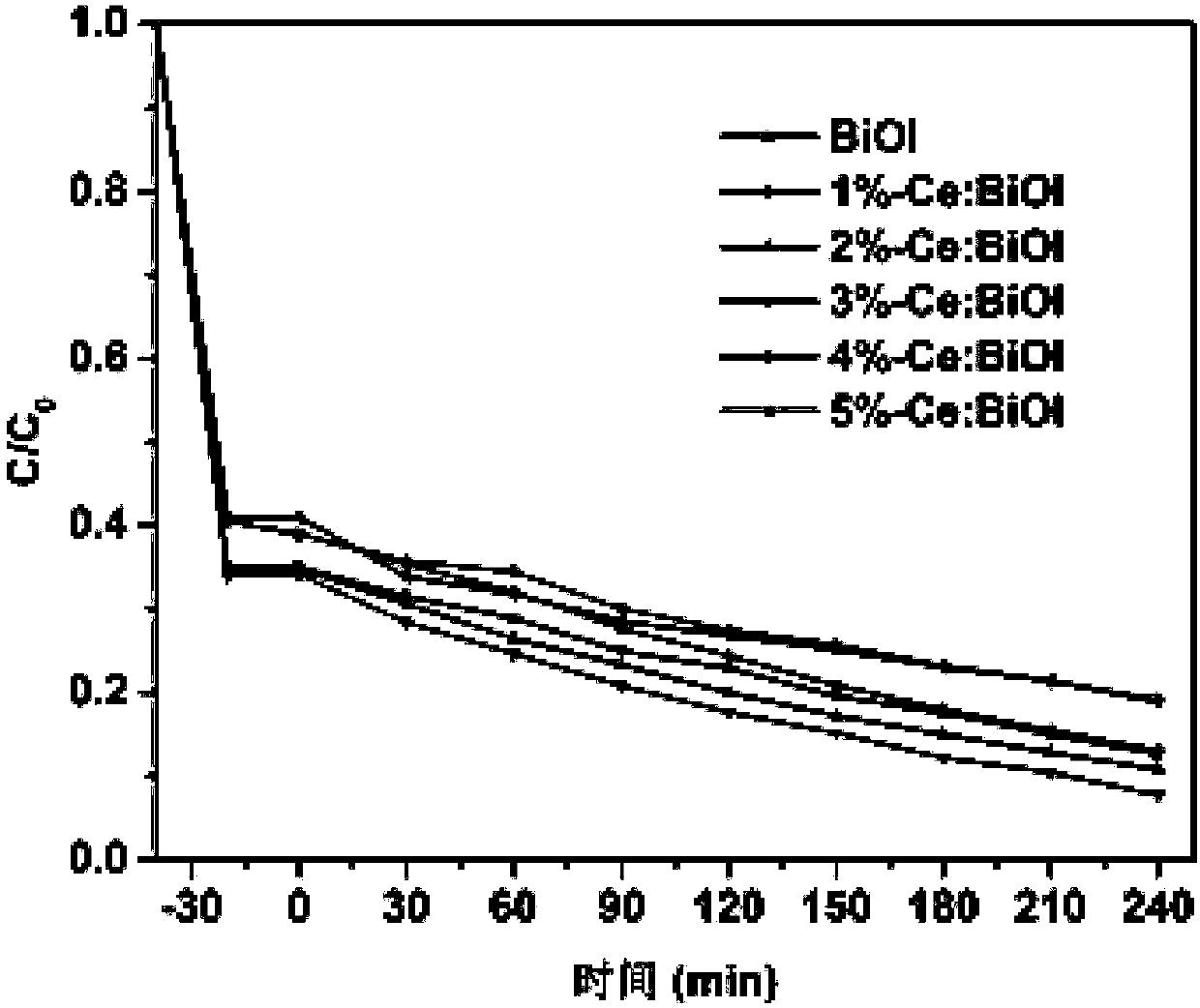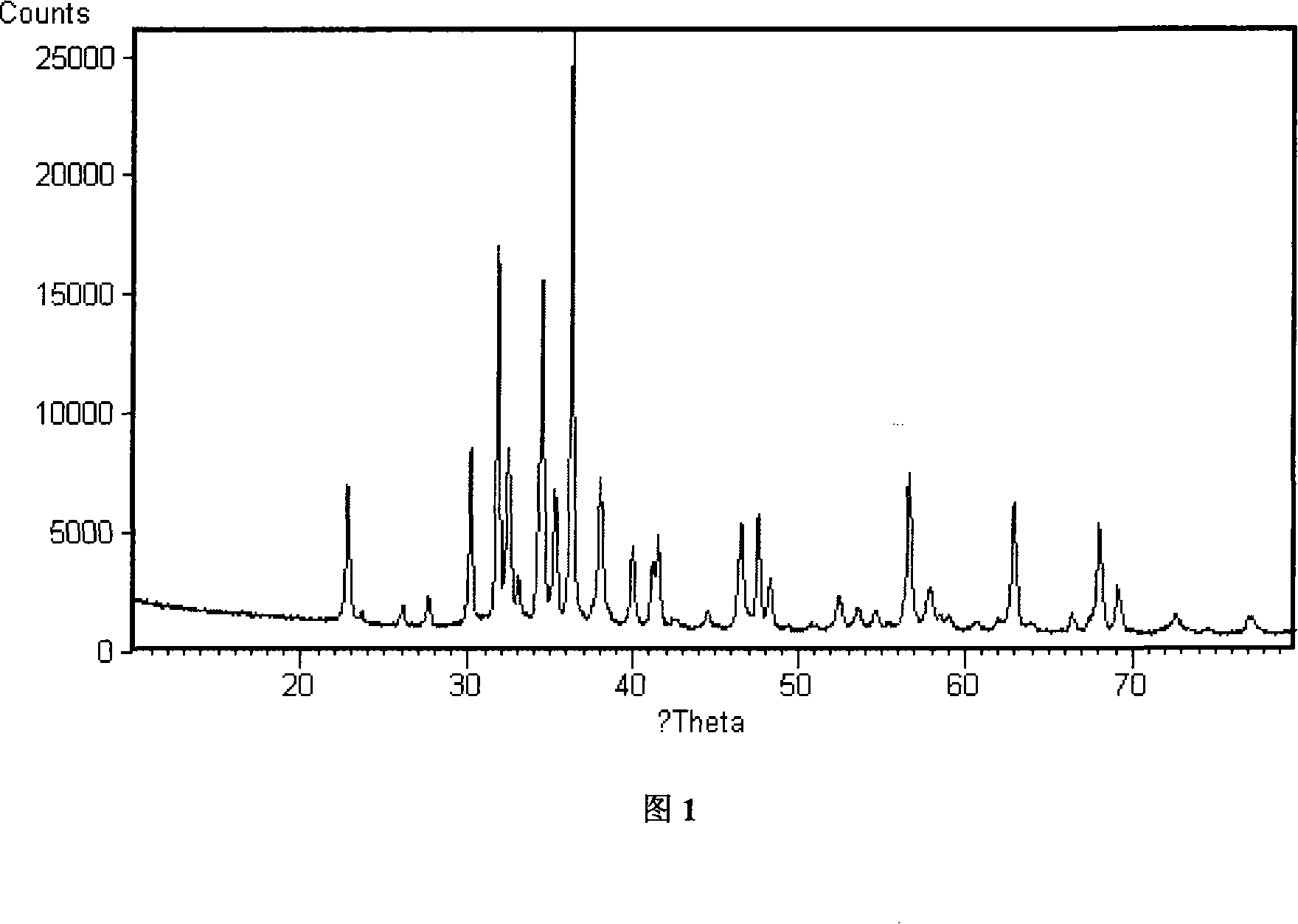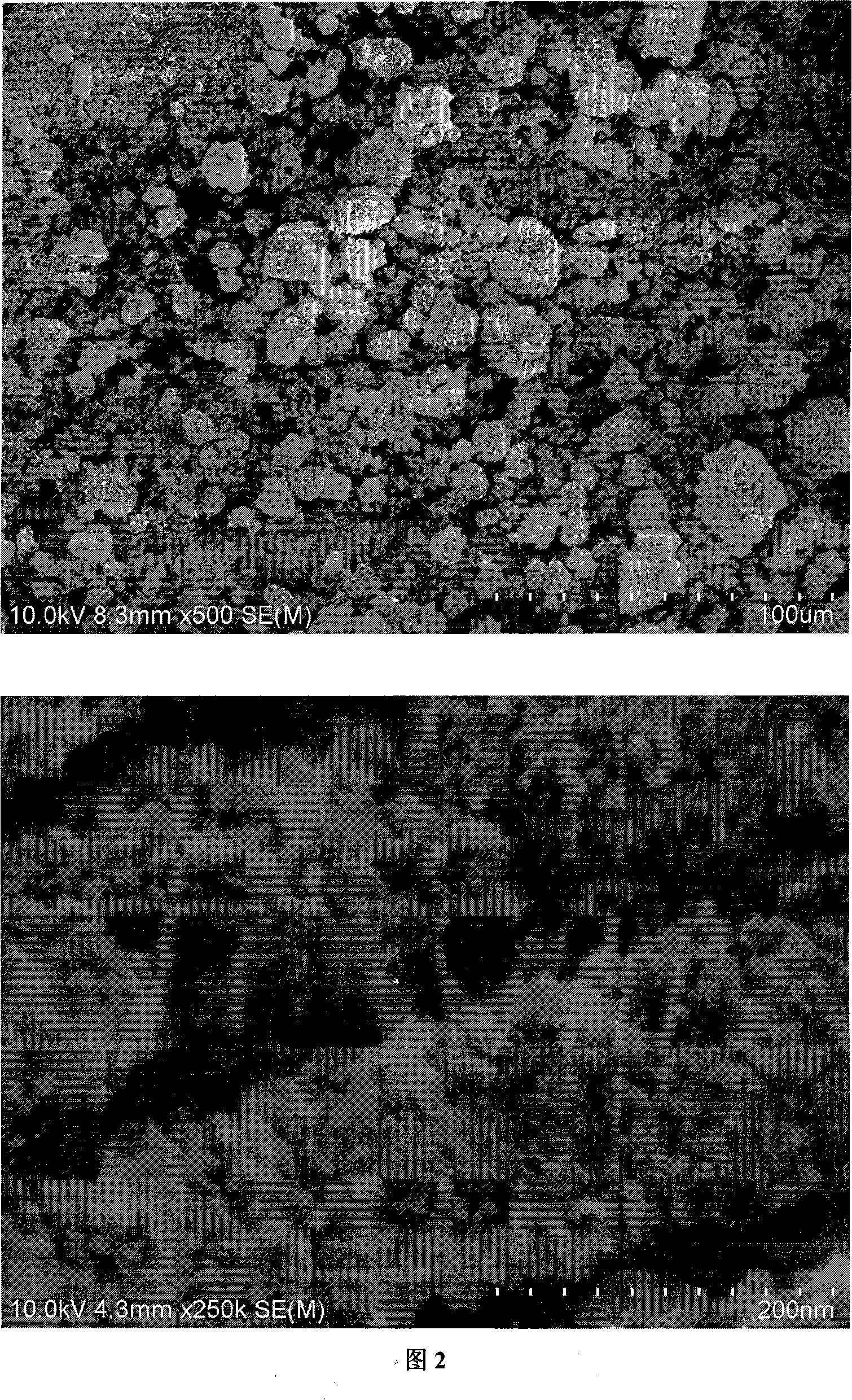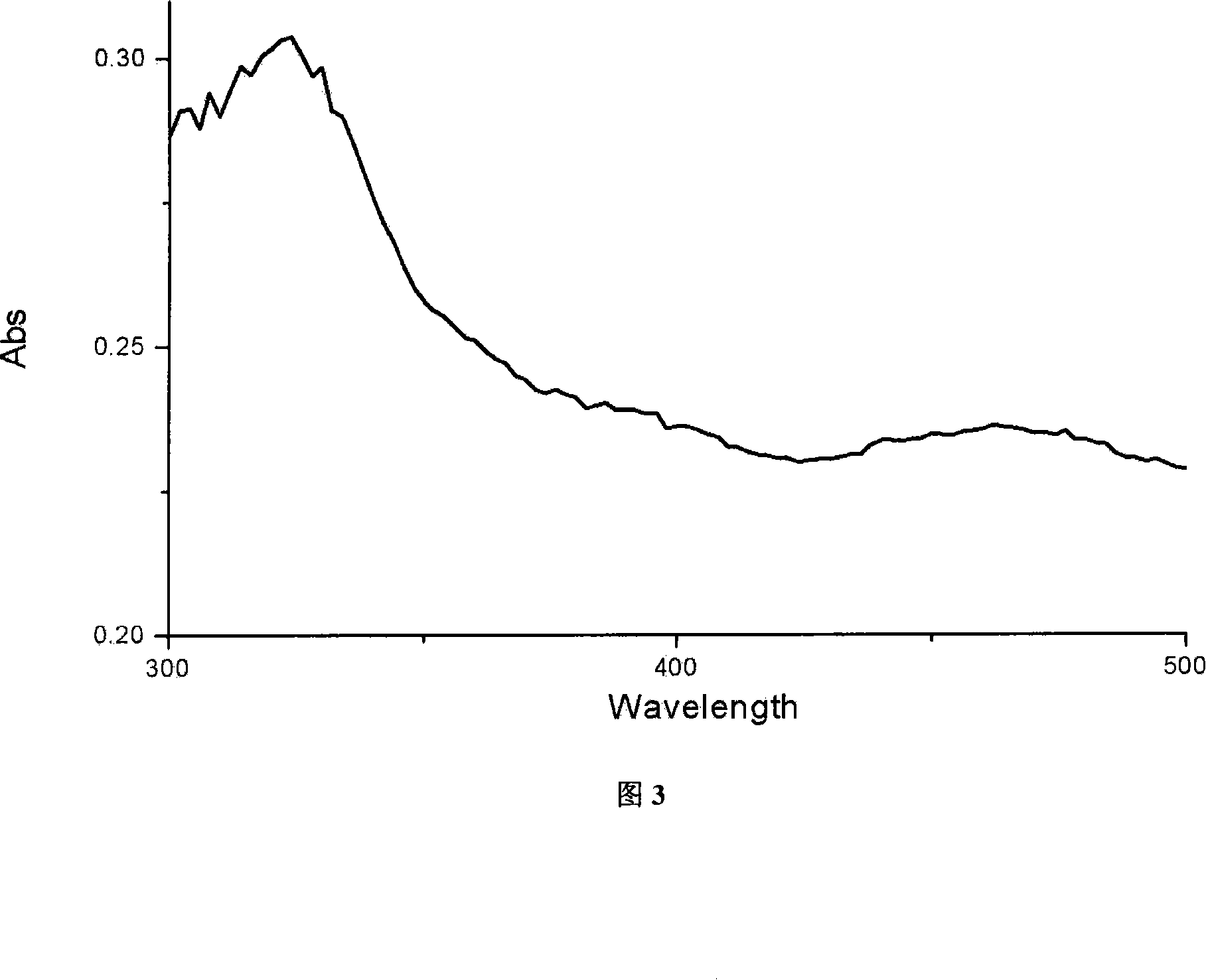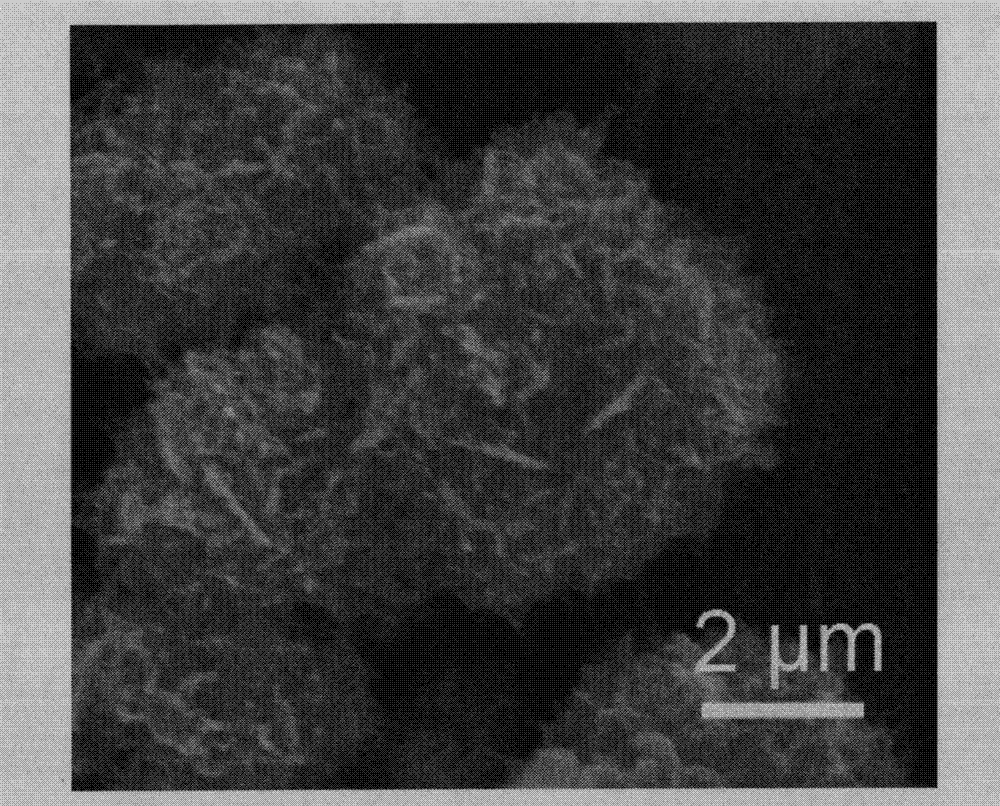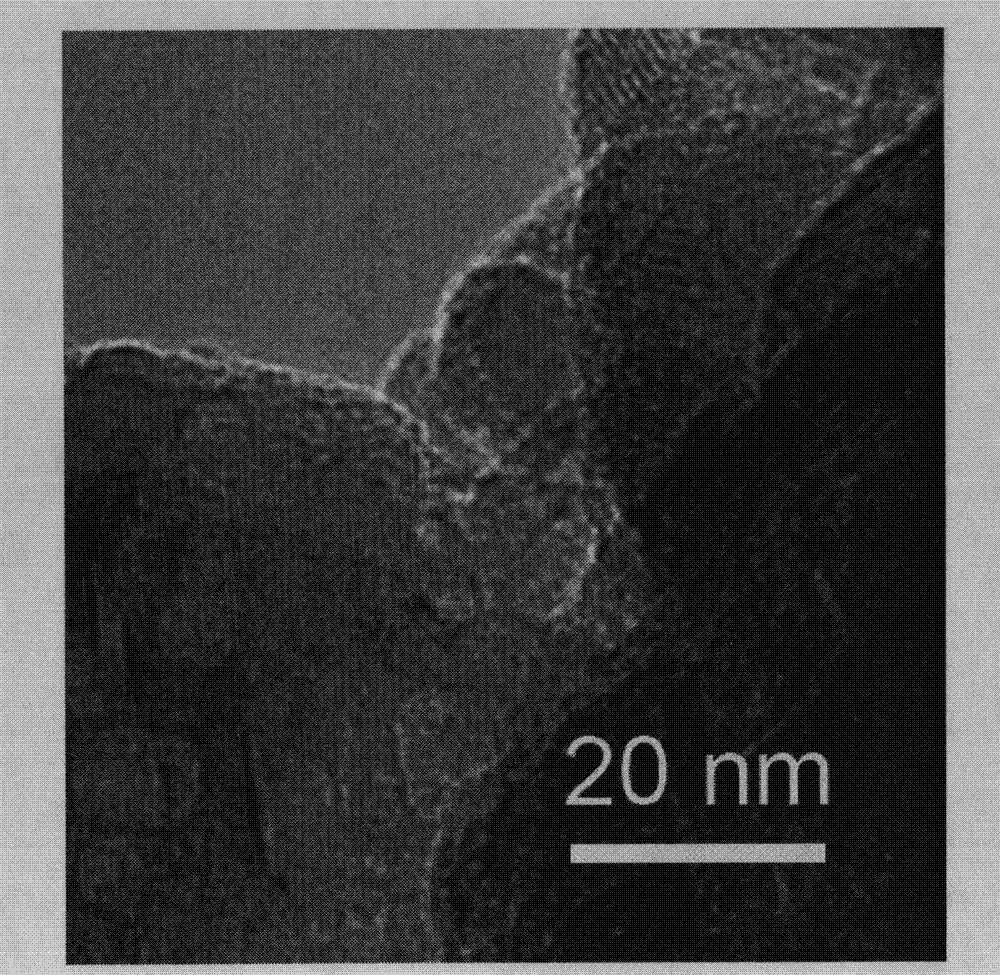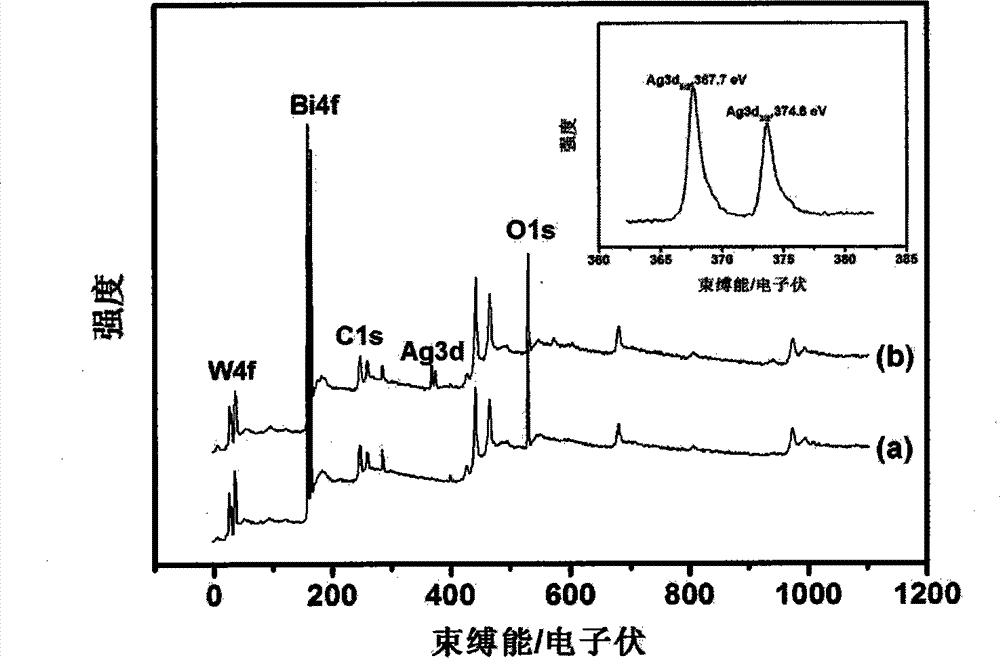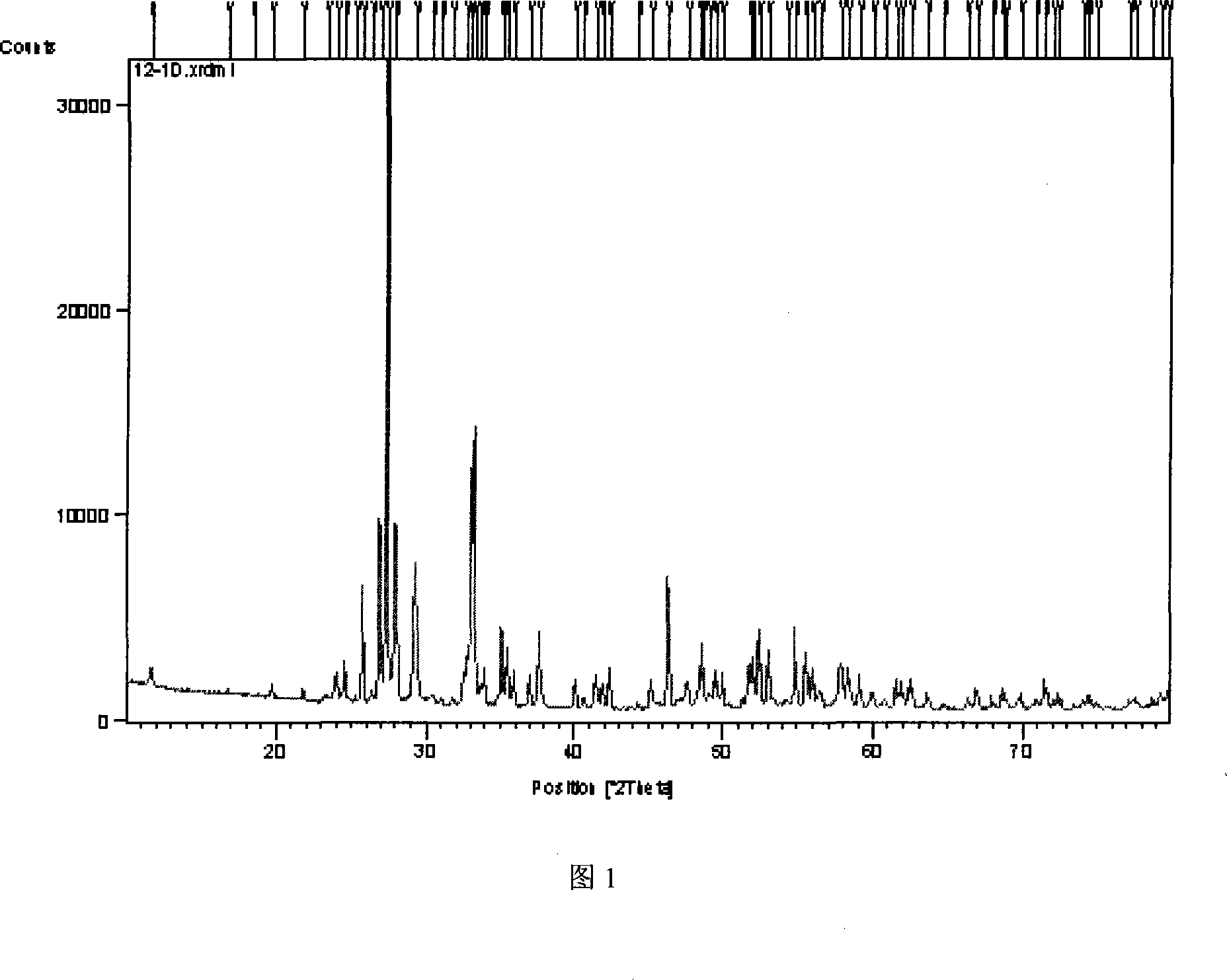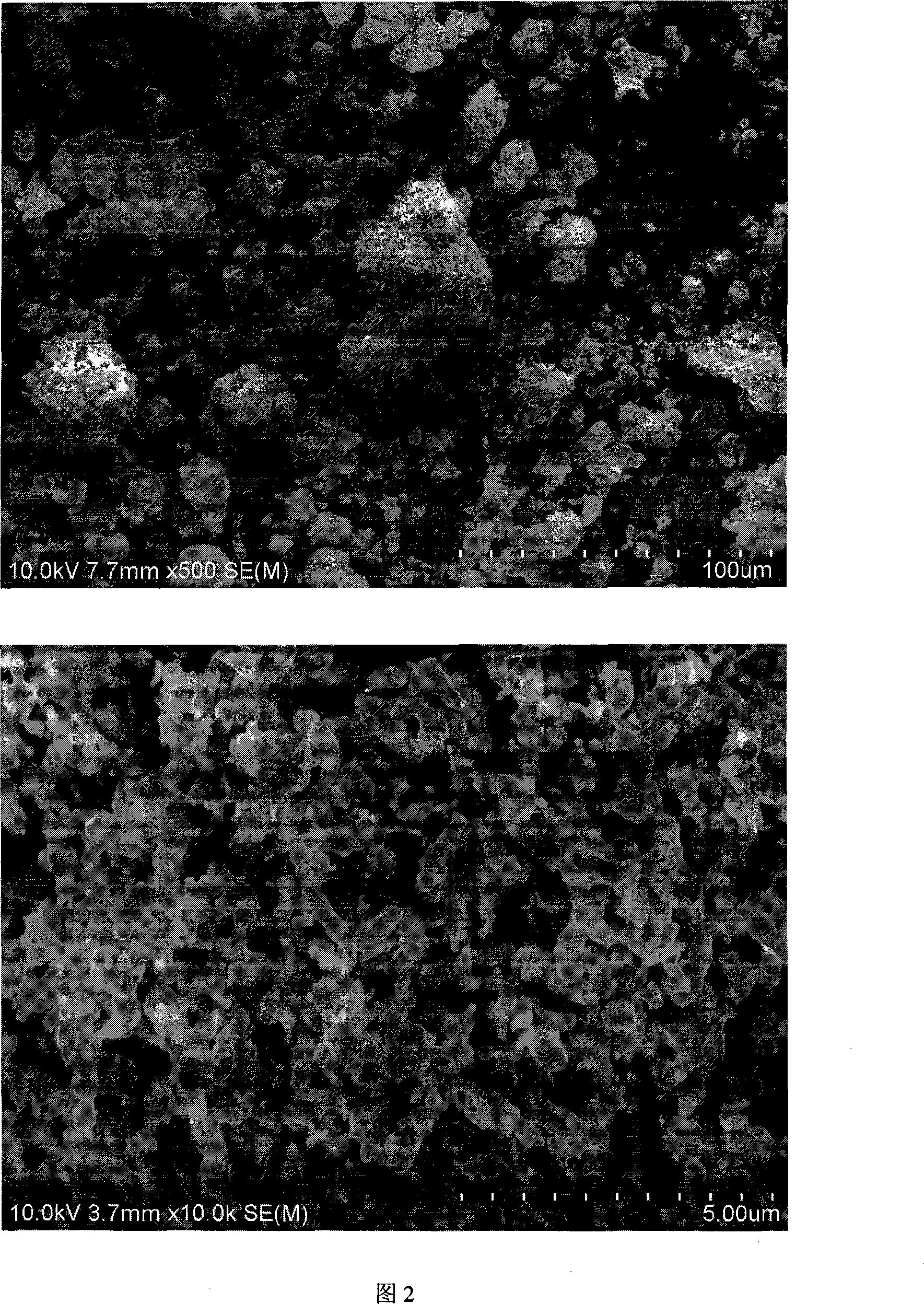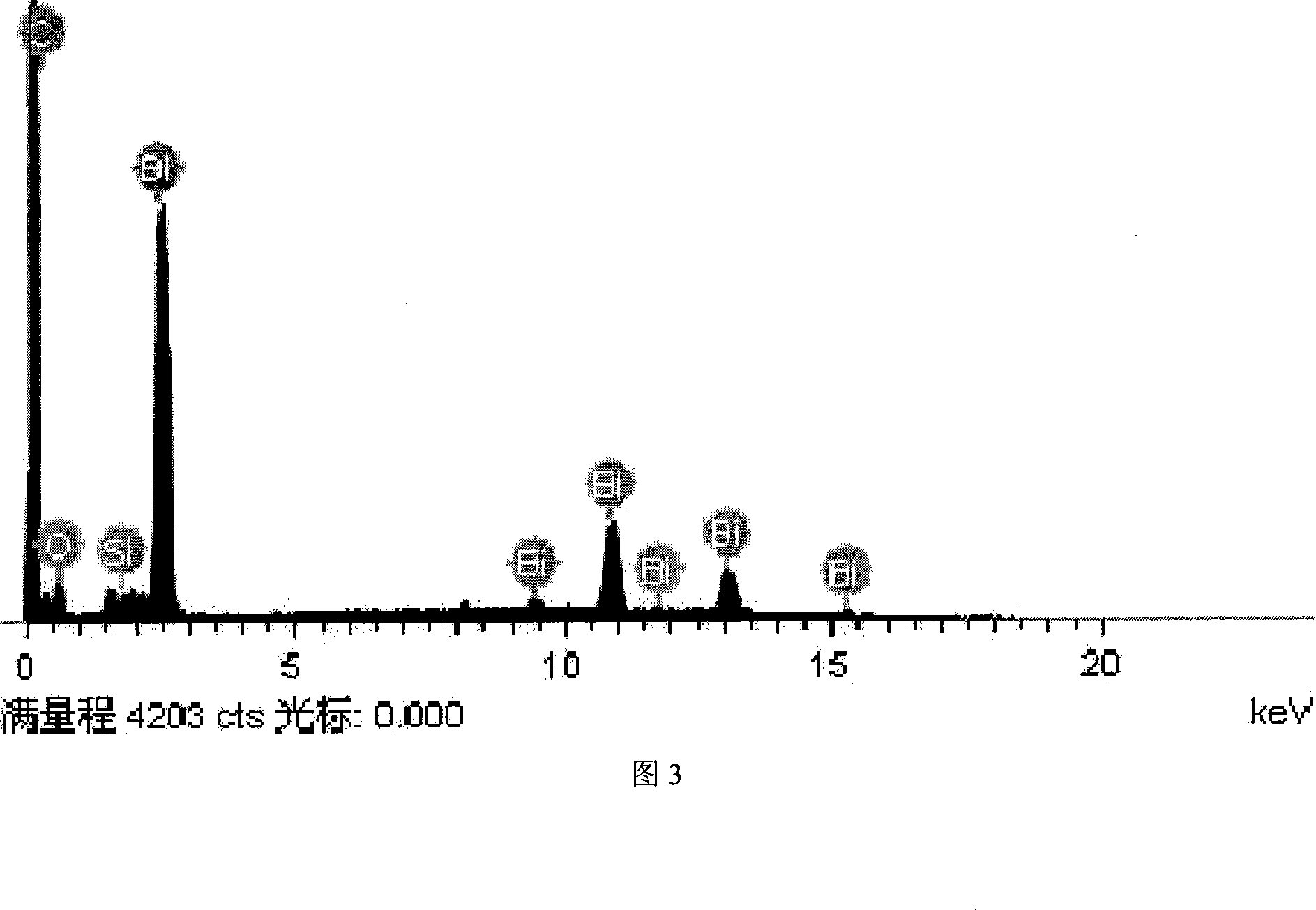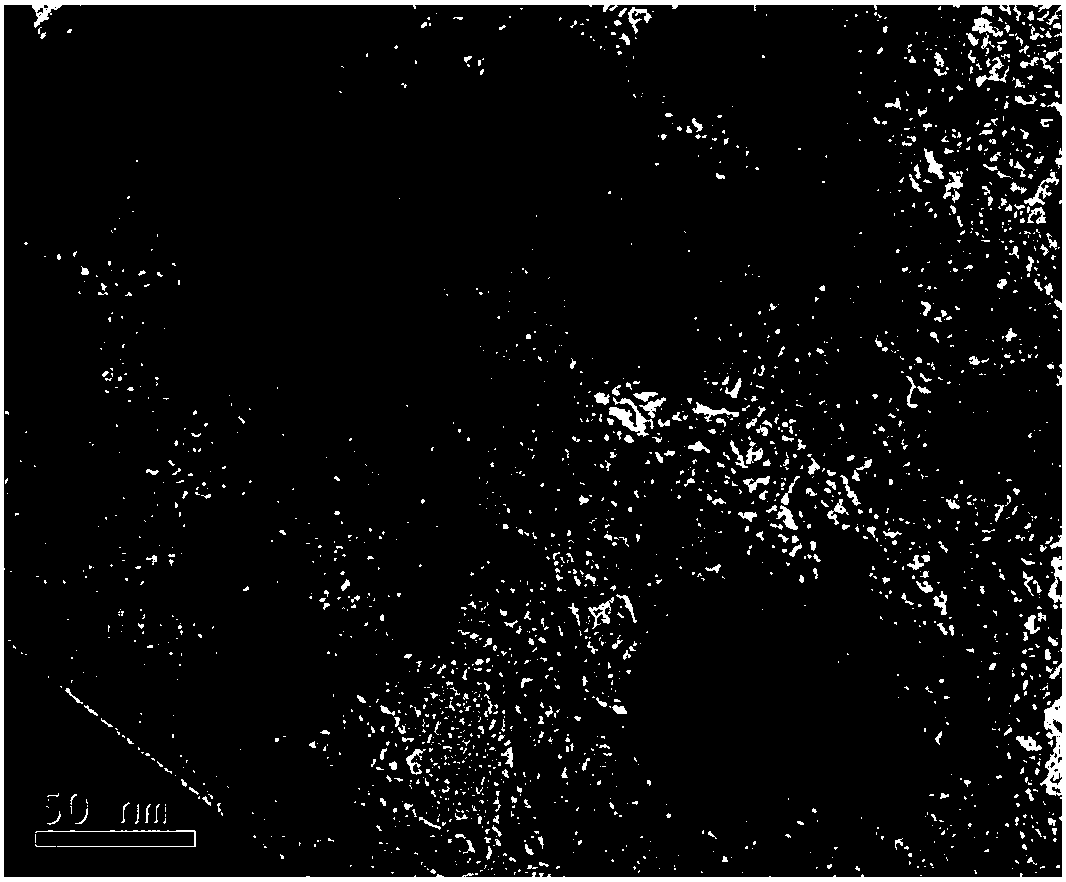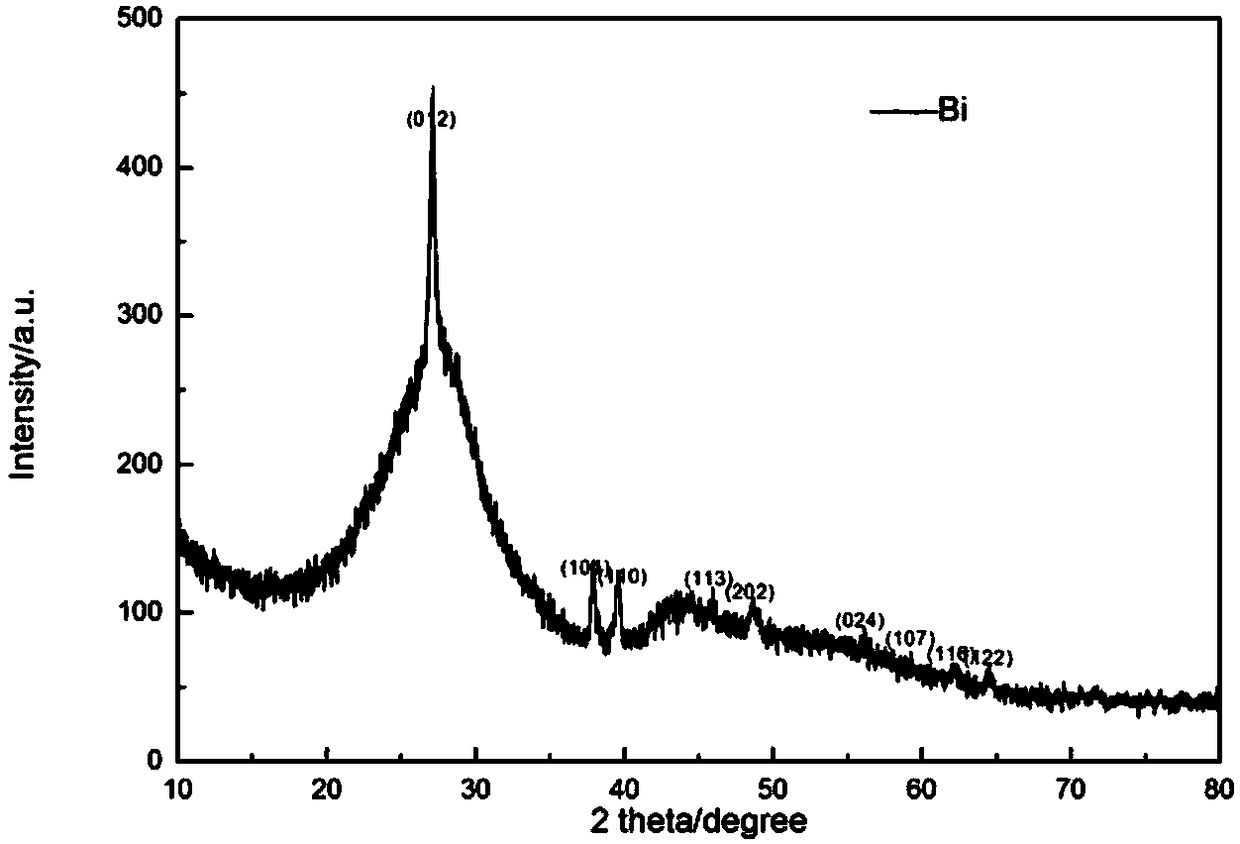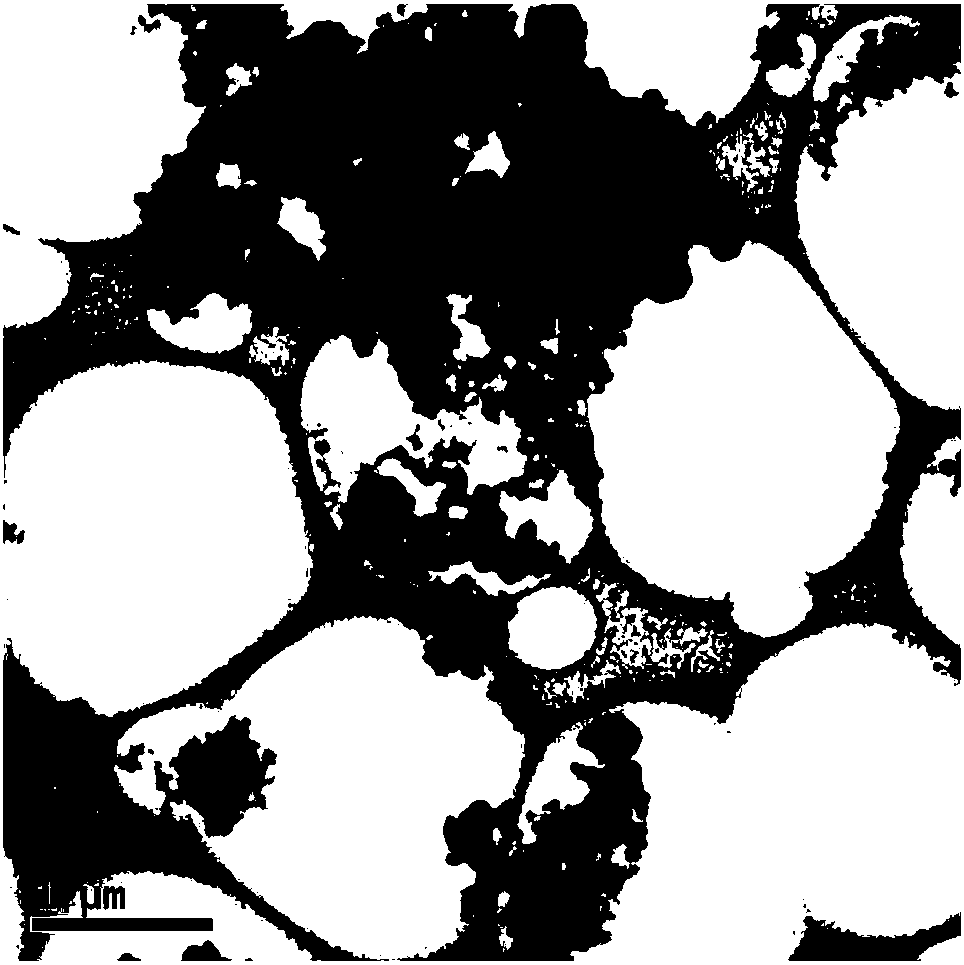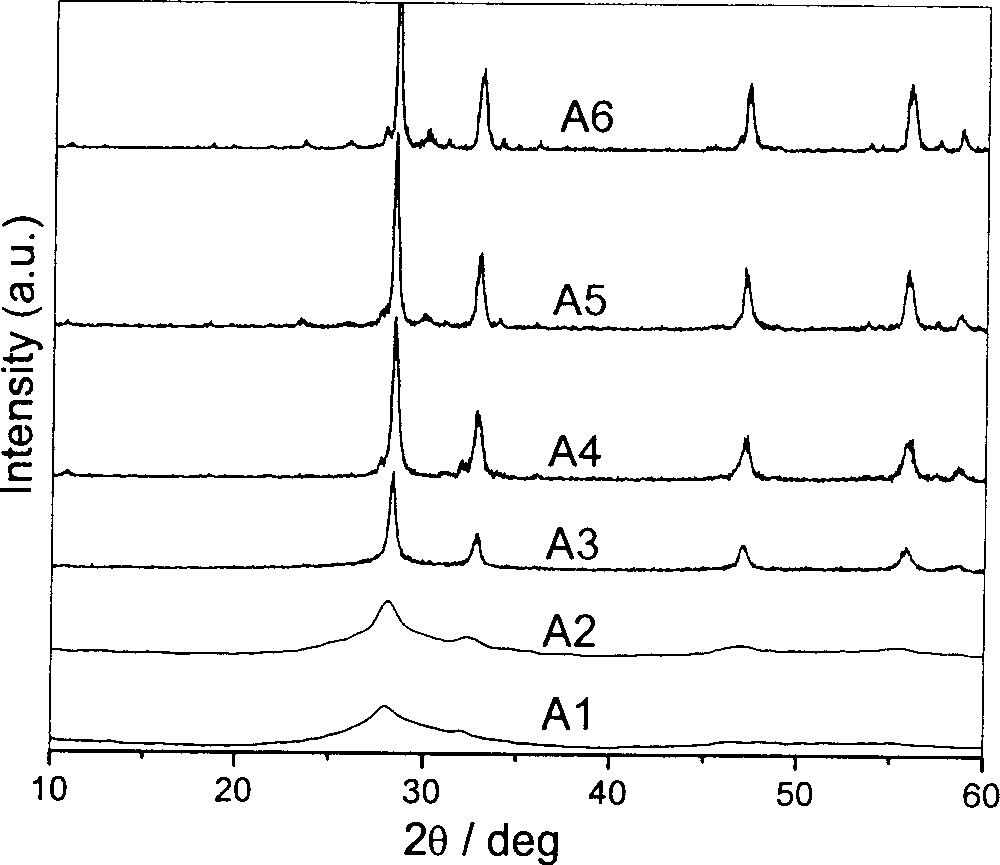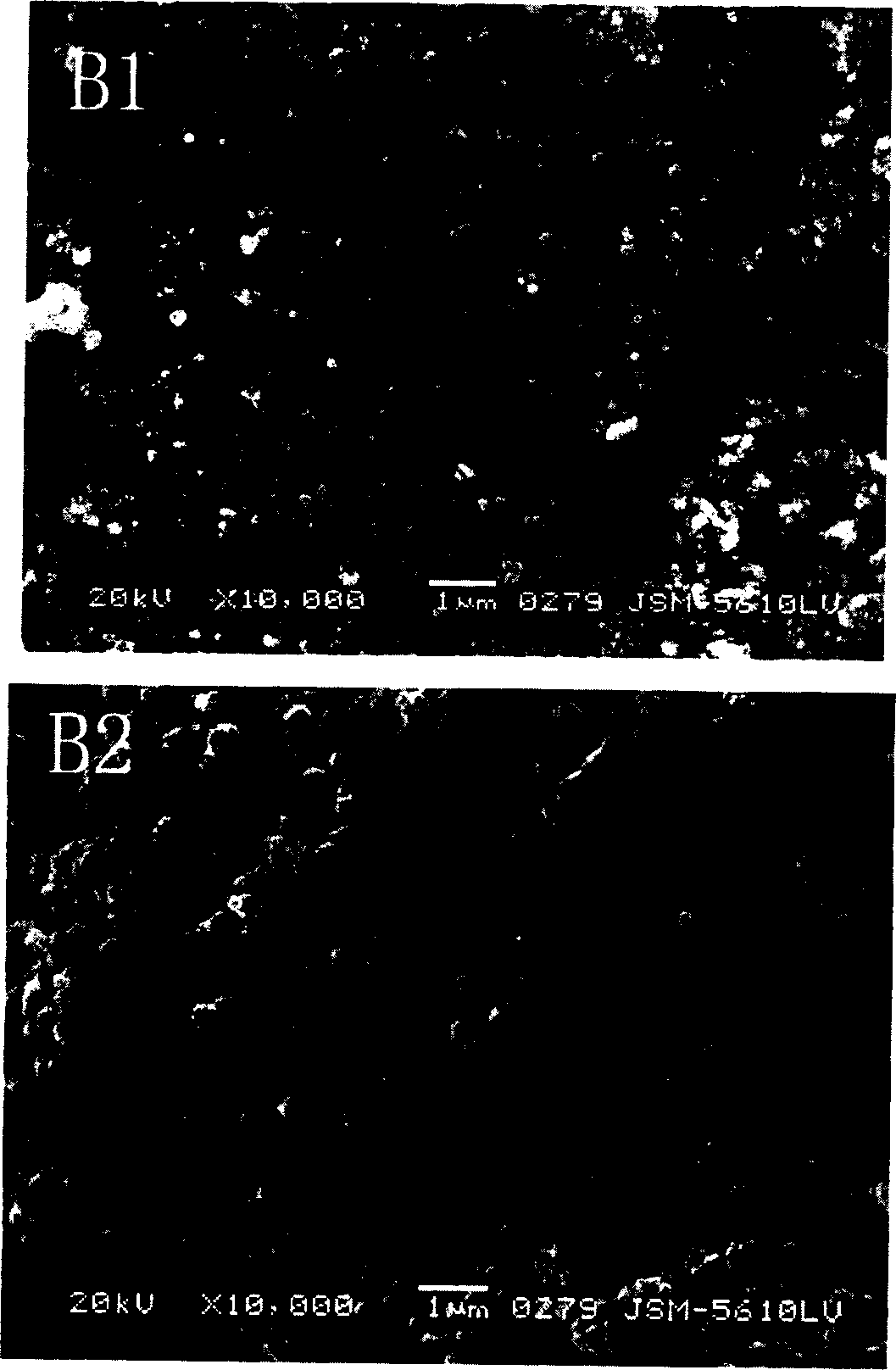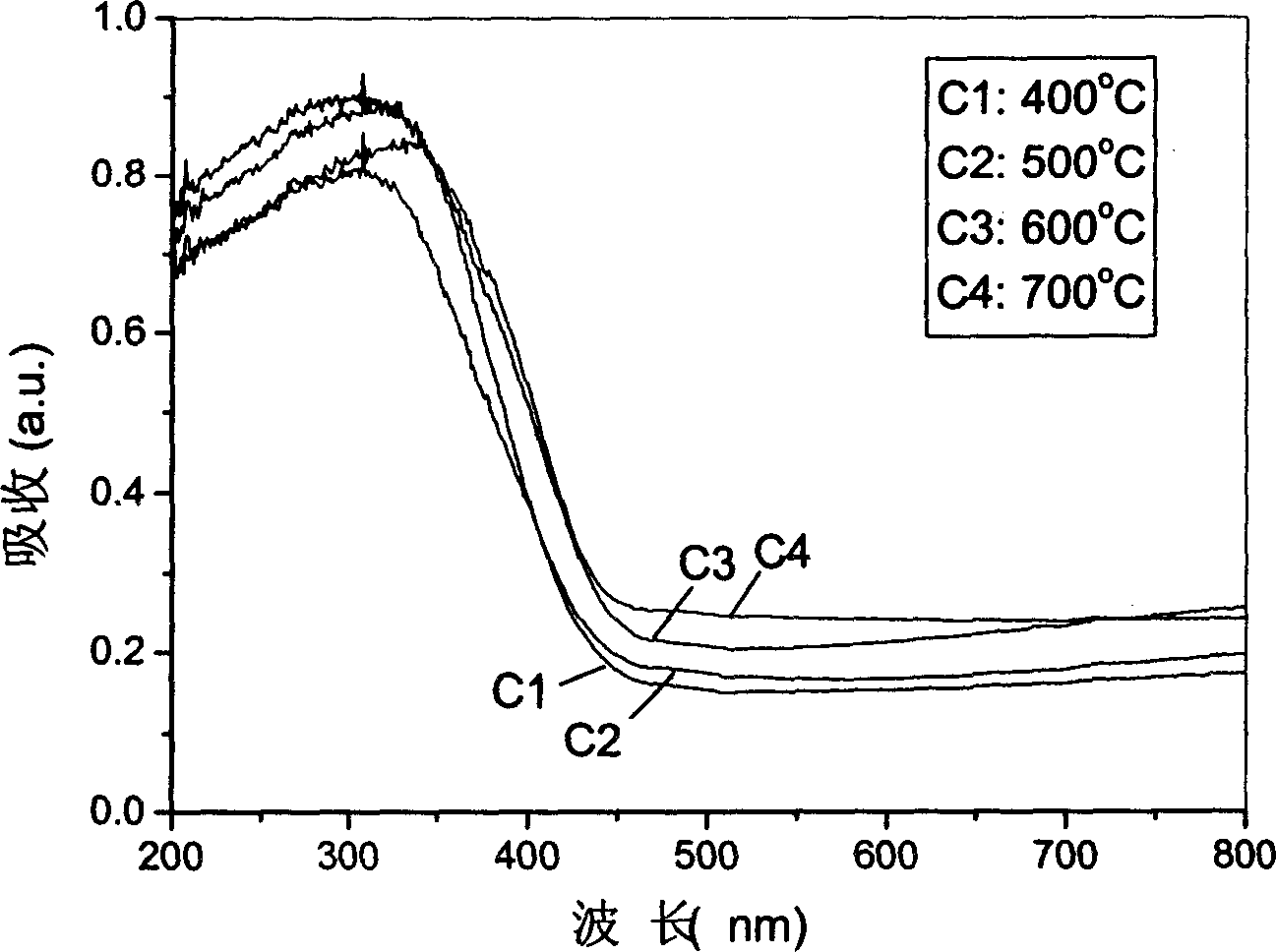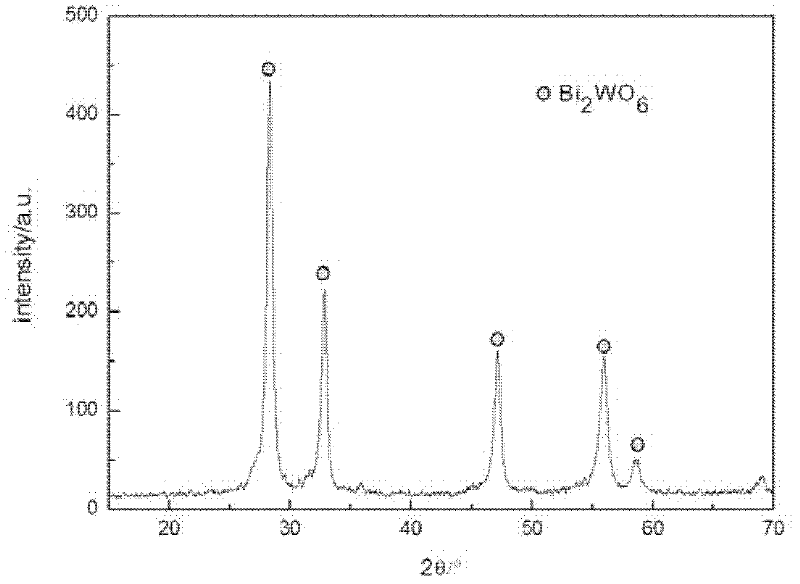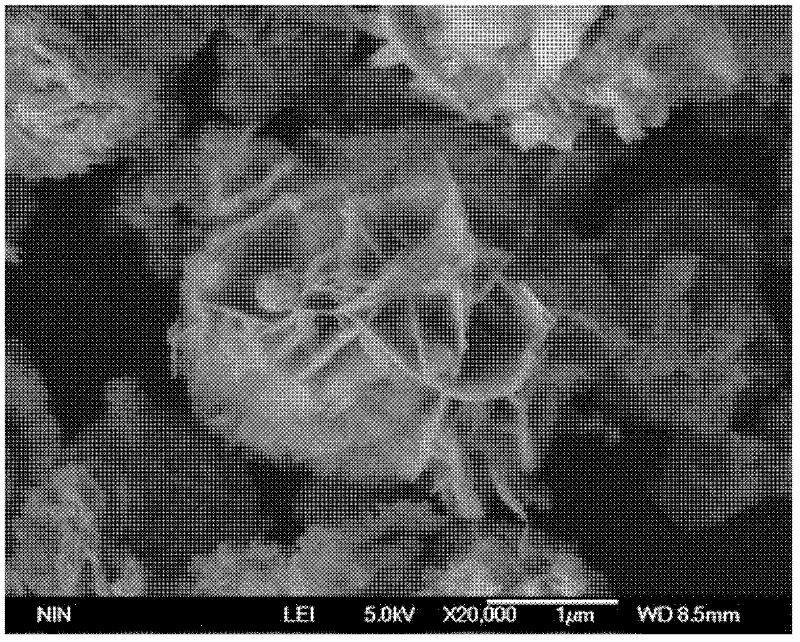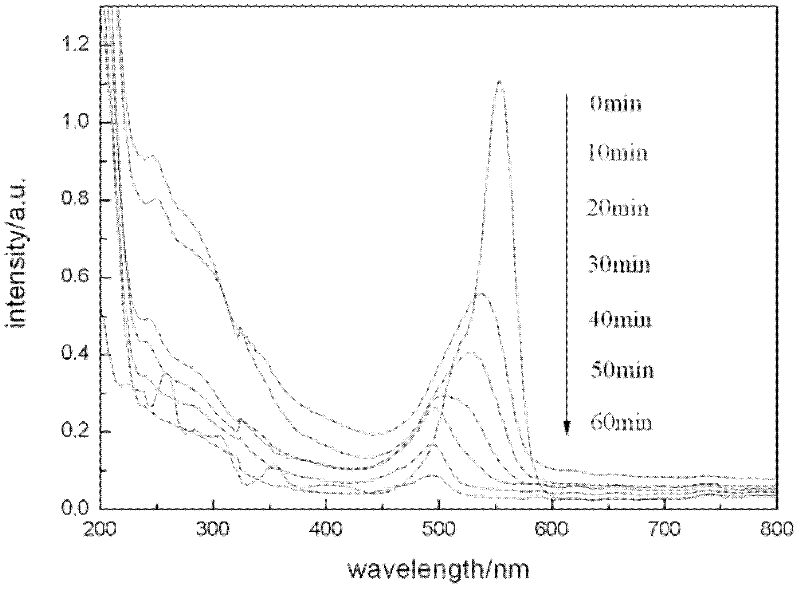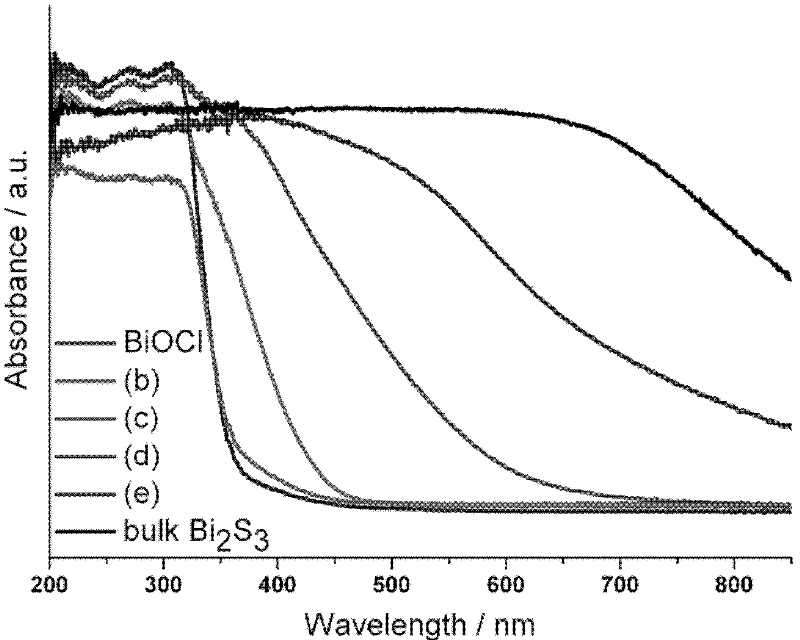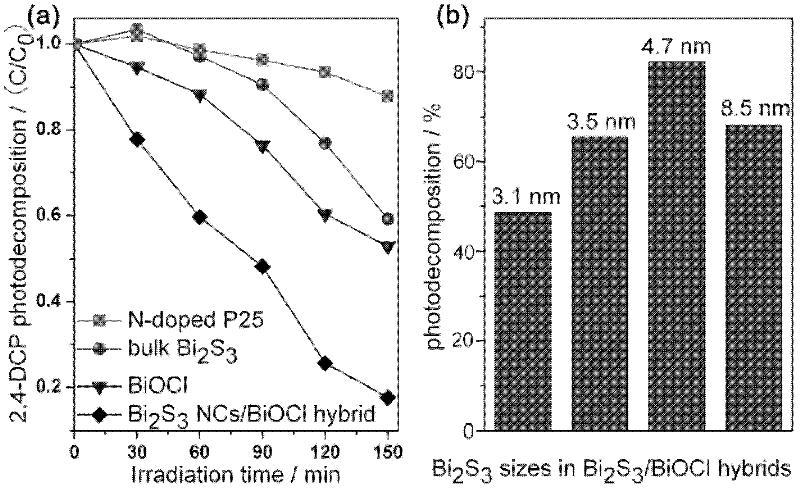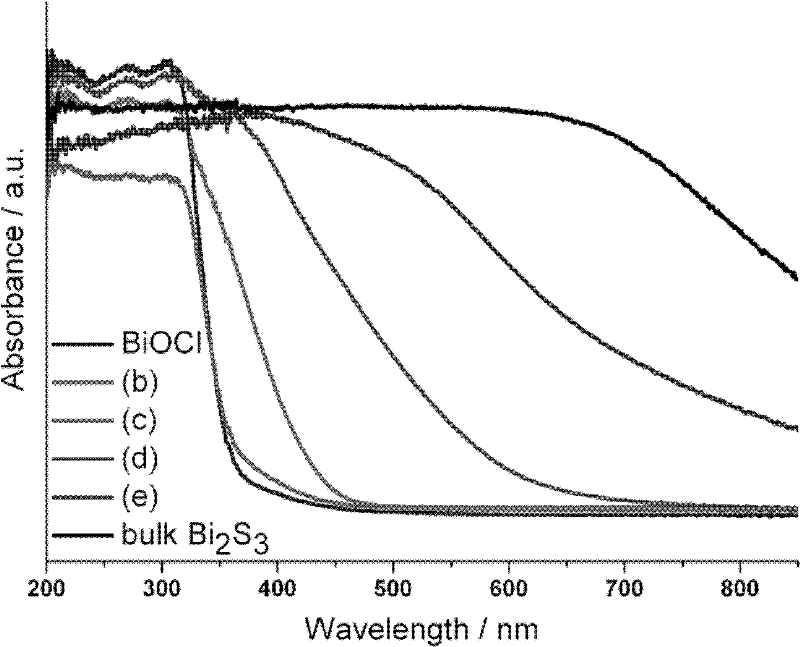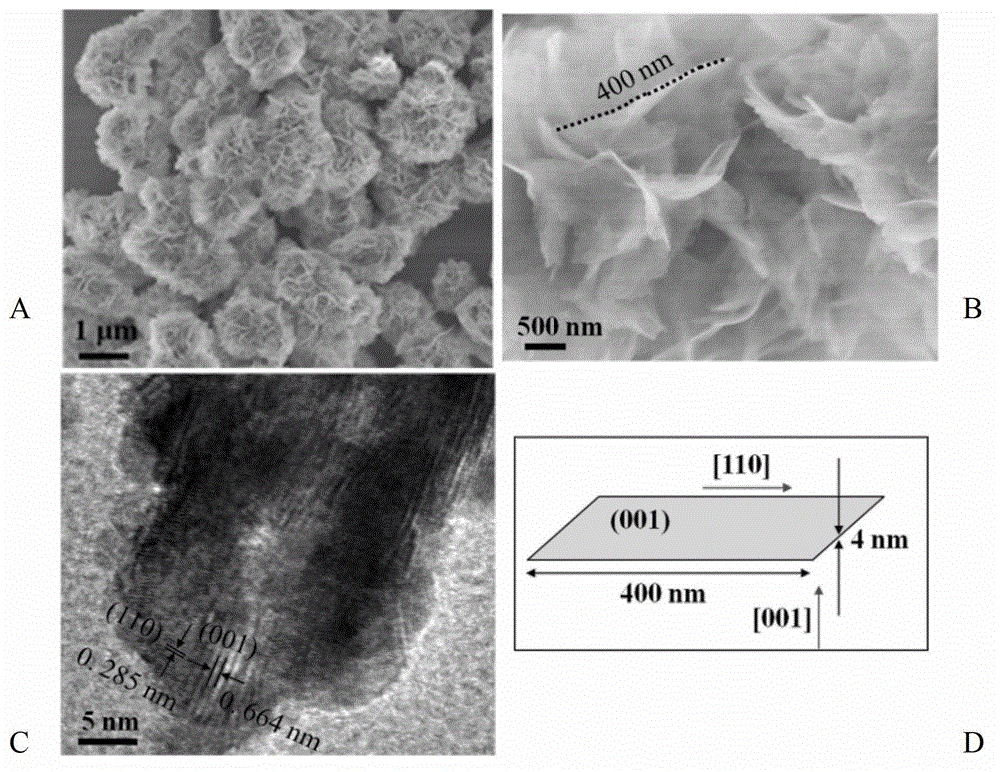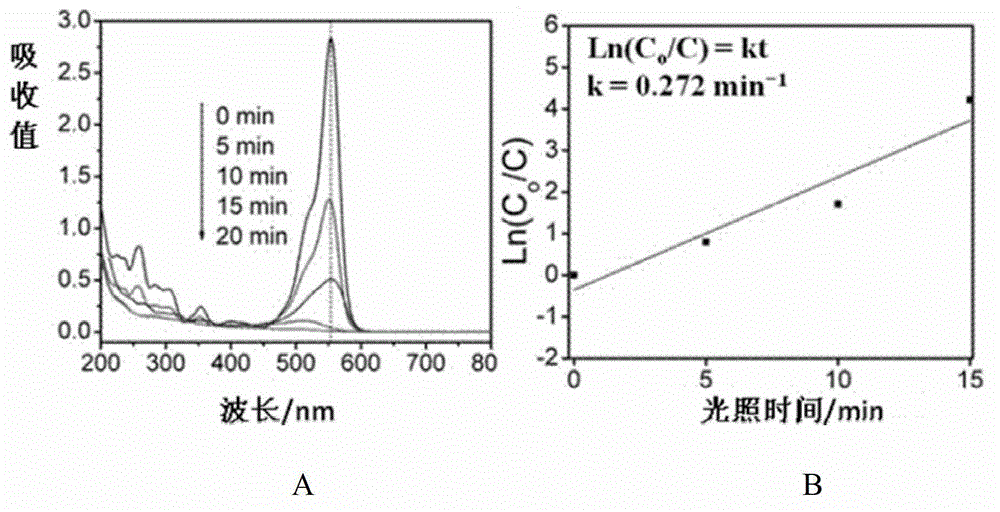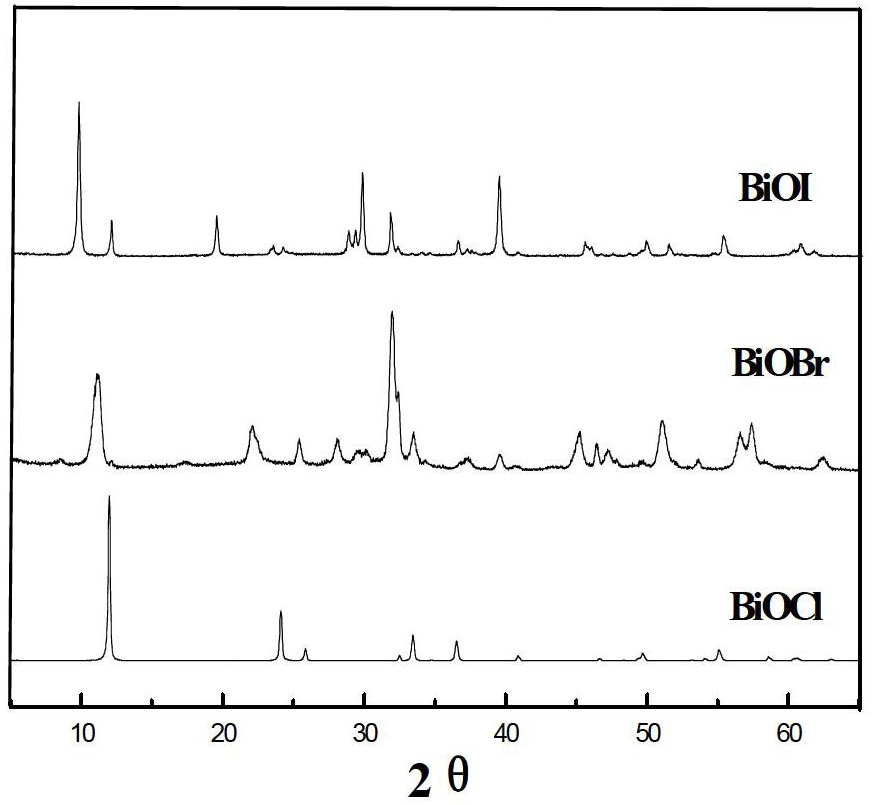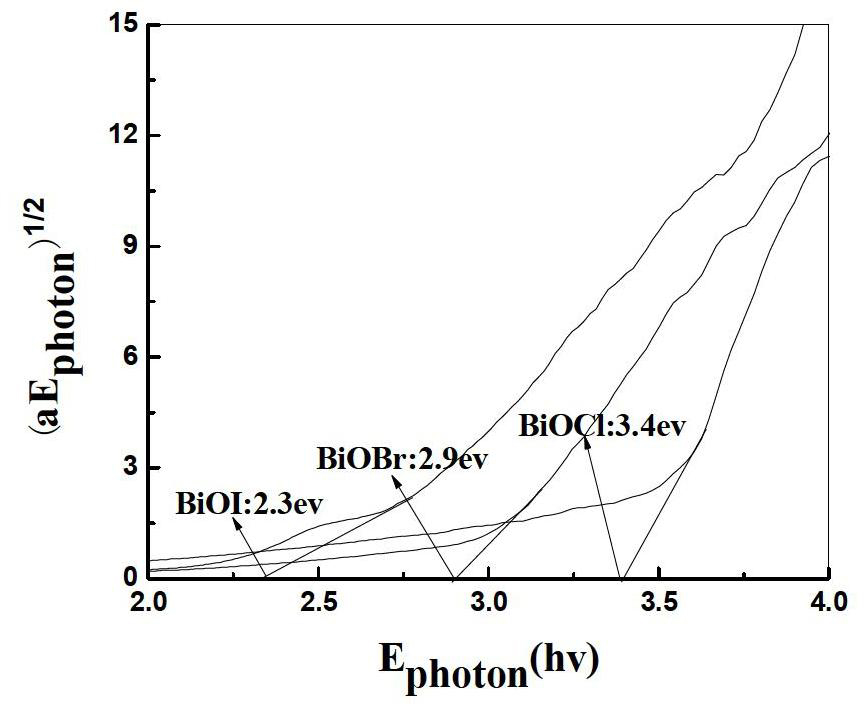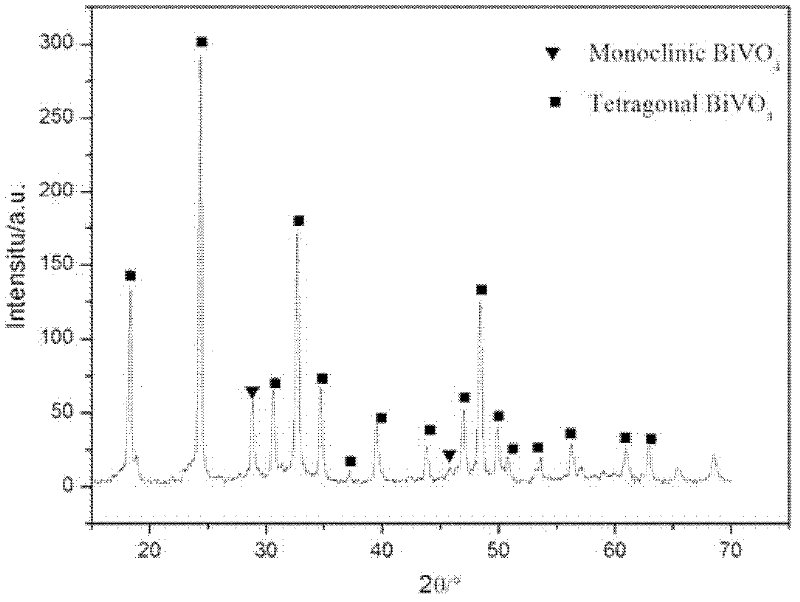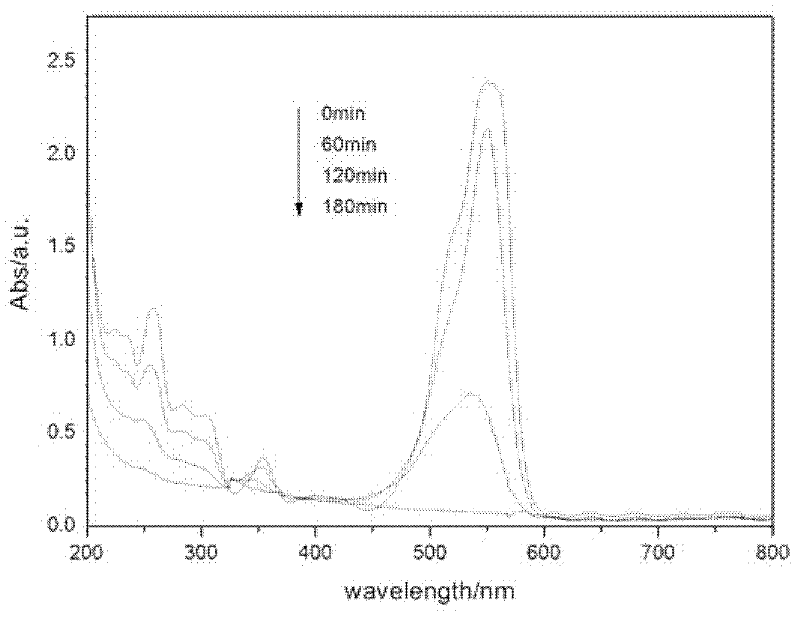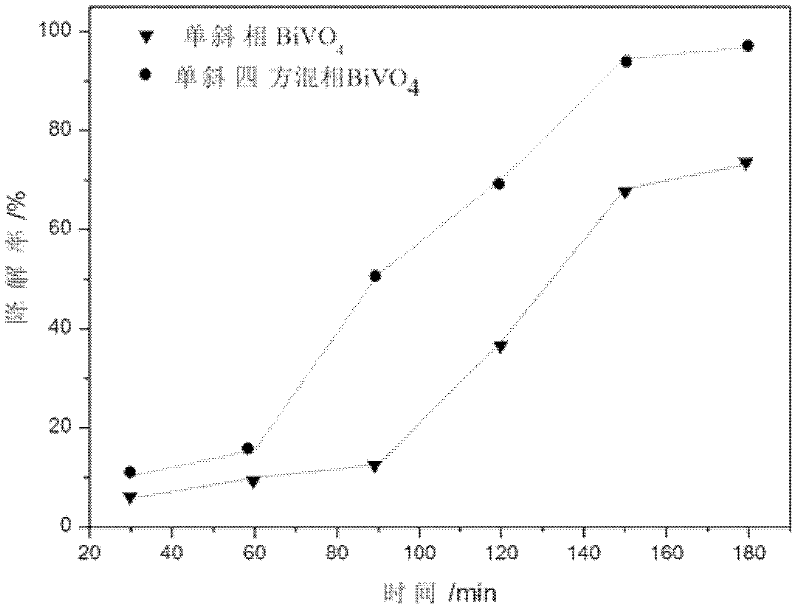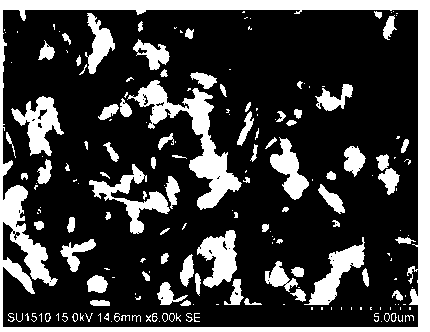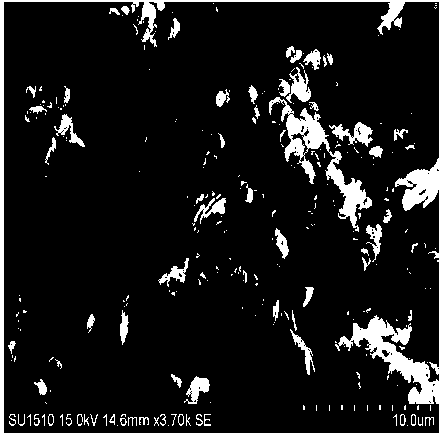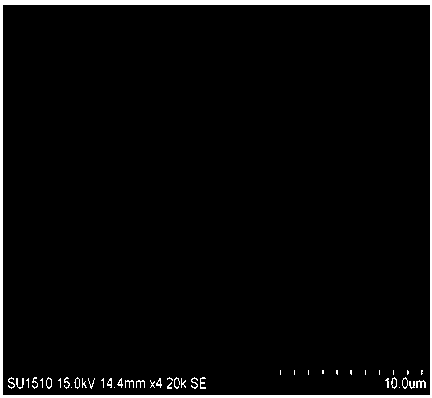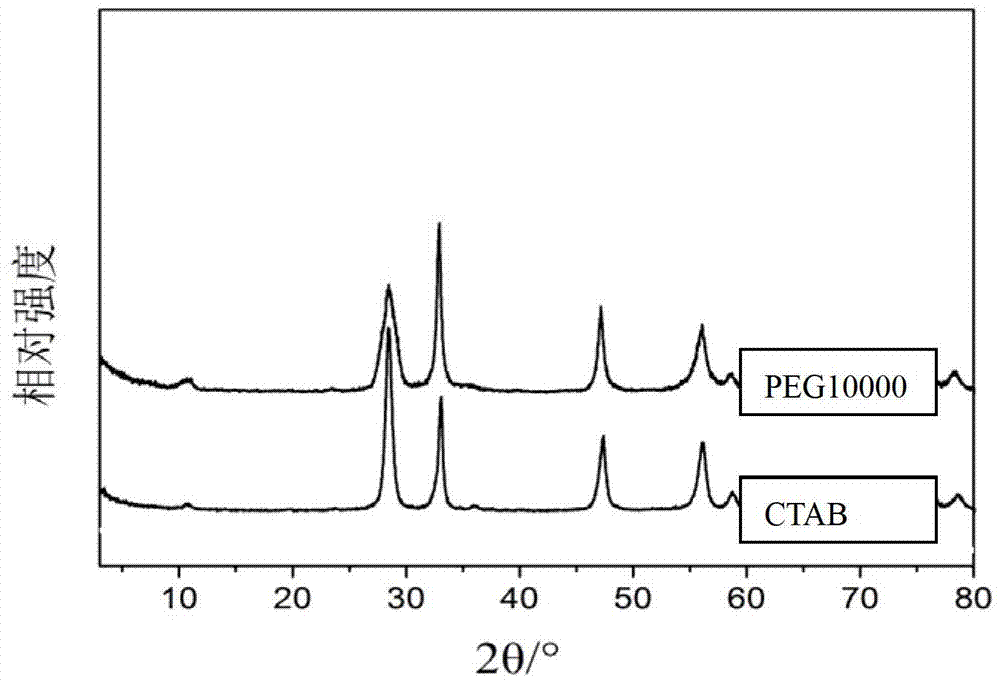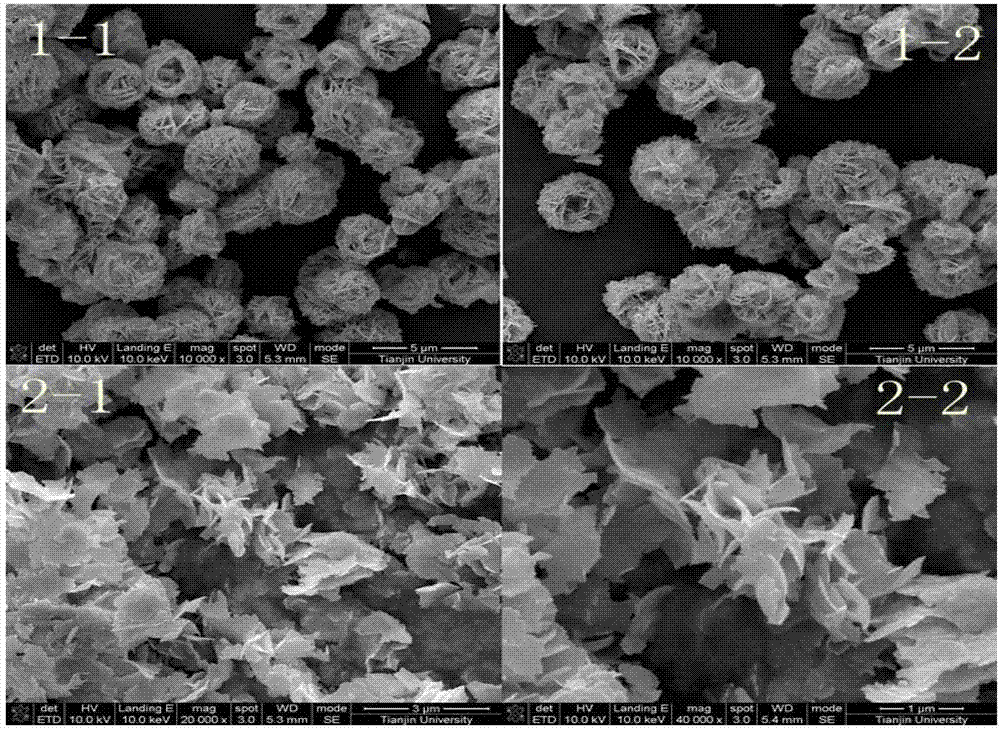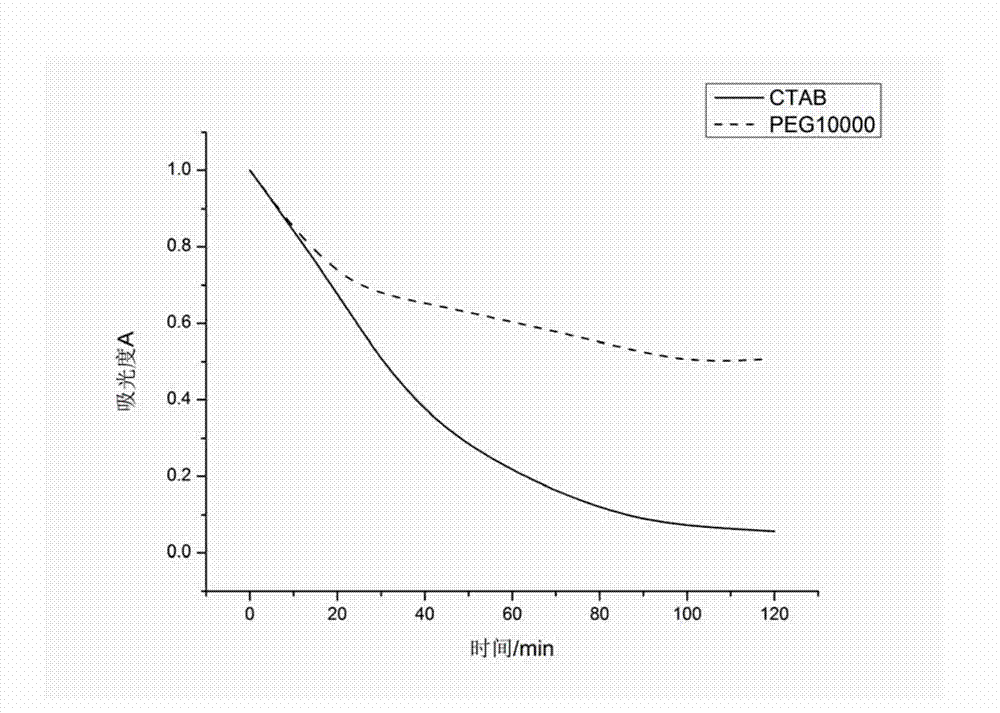Patents
Literature
1767 results about "Bismuth nitrate" patented technology
Efficacy Topic
Property
Owner
Technical Advancement
Application Domain
Technology Topic
Technology Field Word
Patent Country/Region
Patent Type
Patent Status
Application Year
Inventor
Bismuth(III) nitrate a salt composed of bismuth in its cationic +3 oxidation state and nitrate anions. The most common solid form is the pentahydrate. It is used in the synthesis of other bismuth compounds. It is available commercially.
Visible light responsive pucherite-graphene composite photocatalyst and preparation method thereof
ActiveCN102125832AImprove adsorption capacityIncrease surface areaMetal/metal-oxides/metal-hydroxide catalystsAmmonium metavanadateUltrasonic dispersion
The invention discloses a visible light responsive pucherite-graphene composite photocatalyst and a preparation method thereof. The composite photocatalyst is prepared by compositing pucherite and graphene according to the mass ratio of (1:2)-(1:5). The preparation method comprises the following steps of: putting graphite oxide into a mixed solution of water and ethanol for ultrasonic dispersion,respectively adding bismuth nitrate and ammonium metavanadate into ethanol for stirring, and finally mixing the three systems and regulating the pH to be greater than 7; then, transferring the mixed system into a hydrothermal kettle for reacting; and after the reaction is finished, centrifugally separating, washing and drying the product to obtain a leaf-shaped pucherite-graphene composite photocatalyst. In the invention, by using graphene as a template, the leaf-shaped pucherite-graphene composite photocatalyst is prepared by a hydrothermal synthesis method. The pucherite-graphene composite photocatalyst prepared by the method disclosed by the invention has better application prospect and economic benefit in the aspect of sewage treatment.
Owner:NANJING UNIV OF SCI & TECH
Method and composition for inhibiting bacteria
InactiveUSRE37793E1Prevent bacterial growthAvoid bacterial infectionHeavy metal active ingredientsBiocidePreservativeDisinfectant
A composition comprising a trivalent bismuth salt, particularly bismuth nitrate, and dimercaprol is described. Methods for using the composition as a bacteriocidal and bacteriostatic agent and as a disinfectant and preservative are also provided.
Owner:WINTHROP UNIV HOSPITAL
Method for preparing super-fine vanadic-acid bismuth-yellow pigment
InactiveCN101070435AMild reaction conditionsReduce manufacturing costPigmenting treatmentVanadium compoundsBismuth vanadateGranularity
The invention discloses the methods of preparation for a superfine bismuth vanadate yellow pigment, the characteristics of its bismuth nitrate, partial vanadate or vanadate are the main raw material. Through controlling of its appropriate pH and temperature to get the Ultra-fine particles,which composed of bismuth vanadate yellow pigments.well by adding surfactant or changing vanadium source, itcan further control particle morphology, which were prepared by a diameter of 50-150 nm spherical particles, 100-200 nanometer length, width 50-100 nanometers Flake Vanadate Bismuth or length of 200-300 nm rod bismuth vanadate. The preparation of this invention is a simple process, and can be controlled morphology, the bismuth vanadate can meet the needs of different occasions, which can be widely used in the automotive topcoat, ink, paint and other requirements for a higher size area.
Owner:LUDONG UNIVERSITY +1
Bismuthyl carbonate micro flowery material with graded structure and preparation method thereof
The invention relates to a bismuthyl carbonate micro flowery material with a graded structure, which is structurally characterized in that two-dimensional nano flakes are staggered to form a flower shape, and the average diameter of the flakes is 3 to 4 microns. The material is prepared by fist dissolving bismuth nitrate into dilute nitric acid and then gradually dripping the dilute nitric acid into excessive sodium carbonate solution and reacting the solution. A preparation method can be implemented at the low temperature and the normal pressure, and has the advantages of short time consumption, low cost, simple equipment, easy operation and large-scale production. Because of a large specific surface area, the prepared bismuthyl carbonate micro flowery material with the graded structure has important practical application in the aspects of pharmacy and sterilization; and meanwhile, the material with the large specific surface area has good performance in the aspect of degrading organic pollutants by photocatalysis.
Owner:SHANDONG UNIV
Method for preparing bismuth ferrite photocatalyst
InactiveCN101890354ACause secondary pollutionFully contactedWater/sewage treatment by irradiationWater contaminantsSolventPhotocatalytic degradation
The invention belongs to the fields of environmental science and engineering, and in particular relates to a method for preparing a bismuth ferrite photocatalyst capable of efficiently degrading organic pollutants in water by utilizing photocatalysis technology. The photocatalyst bismuth ferrite is synthesized by a solvent method; and during synthesis, a molar ratio of bismuth nitrate to ferric nitrate is 12:1, a xenon lamp is taken as a light source, and the bismuth ferrite is fully mixed with neural red solutions with different concentrations to photo-catalyze and degrade the neutral red dye in aqueous solution. The invention provides a high-efficiency method for removing the neutral read dye from the water. The method can remove over 70 percent of the neutral red dye (the concentration is 10 to 30 milligrams / liter) from the water in 2 hours; moreover, the photocatalyst has the advantages of simple preparation process, large particle size and easy recycling; and the method has the advantages of easy operation, low cost, high efficiency, time conservation, and good industrial application prospect.
Owner:BEIJING NORMAL UNIVERSITY
Rare earth/alkaline earth metal and transition metal doped bismuth ferrite nano multiferroic material and preparation method thereof
InactiveCN101734725AImprove magnetic propertiesExcellent magnetic permittivityNanostructure manufactureIron compoundsCapacitanceSolvent
The invention discloses a rare earth / alkaline earth metal and transition metal doped bismuth ferrite nano multiferroic material, and the chemical formula is Bi1-xRxFe1-yMyO3, wherein R is rare earth metal or alkaline earth metal, M is transition metal, x is not less than 0 and not more than 0.30, and y is not less than 0 and not more than 0.02. The preparation method has the steps of taking ferric nitrate, bismuth nitrate, rare earth / alkaline earth metal oxide or nitrate and transition metal nitrate as raw materials, taking ethylene glycol as a solvent, or using a specific additive for matching, mechanically stirring, forming even ethylene glycol solution, then aging at room temperature, evaporating and drying the obtained solution at the temperature of 160-250 DEG C, and carrying out thermal treatment at lower temperature for obtaining rare earth / alkaline earth metal A-site doped, transition metal B-site doped and rare earth / alkaline earth metal A-site and transition metal B-site co-doped bismuth ferrite nanoparticles of 20-100nm. The prepared nano multiferroic material has stable crystal quality, thereby having extensive application prospects in the fields of information storage, magnetic sensors of spin electronic devices, capacitor-inductor integrated devices and the like.
Owner:EAST CHINA NORMAL UNIV
Method for preparing BiVO4 film with photocatalysis performance by using sol-gel method
ActiveCN102949991ASolve the fixed loadSolve the problem of secondary useWater/sewage treatment by irradiationMetal/metal-oxides/metal-hydroxide catalystsAmmonium metavanadateSolvent
The invention discloses a method for preparing a BiVO4 film with photocatalysis performance by using a sol-gel method. The method comprises the following steps of: respectively preparing a precursor solution A and a precursor solution B by taking bismuth nitrate pentahydrate (Bi(NO3)3.5H2O) and ammonium metavanadate (NH4VO3) as raw materials and taking citric acid as a solvent, preparing BiVO4 sol by mixing the precursor solution A with the precursor solution B; and coating the BiVO4 sol to a treated FTO (Fluorine-doped Tin Oxide) glass substrate surface in a spinning manner by adopting a spin coating method so as to form a film, and carrying out pre-annealing and annealing treatment on the film formed after spin coating, thereby obtaining the BiVO4 film fixed on the FTO glass substrate surface. According to the method for preparing the BiVO4 film with the photocatalysis performance by using the sol-gel method, the pure-monoclinic-phase BiVO4 film is prepared by combing the sol-gel method with the spin coating method, the prepared BiVO4 film has certain photocatalysis activity under visible light irradiation, meanwhile, the problem of immobilization of a BiVO4 photocatalyst is solved, and then, the separation, recovery and reuse of the BiVO4 photocatalyst are realized.
Owner:盐城市鹤业实业投资有限公司
BiOI-graphene visible light catalyst and preparation method thereof
InactiveCN102698775ASimple preparation processThe preparation process is economical and environmentally friendlyPhysical/chemical process catalystsWater/sewage treatment by irradiationSolar photocatalysisPtru catalyst
The invention relates to a BiOI-graphene visible light catalyst and a preparation method thereof, belonging to the technical field of inorganic material synthesis and photocatalysis. BiOI and graphene are in the shape of a slice, and the graphene is 1.0%-3.0% by weight. The preparation method of the BiOI-graphene visible light catalyst comprises the following steps of: firstly ultrasonically dispersing graphite oxides into ethanol; then stirring, and adding a certain amount of sodium iodide or potassium iodide water solutions and bismuth nitrate glacial acetic acid solutions at the same time; transferring suspending liquid into a high-pressure reaction kettle with a polytetrafluoroethylene liner, and carrying out crystallization reaction at 120-150 DEG C for 6-12 hours; filtering, washing and drying obtain solid products so as to finally obtain the BiOI-graphene compound light catalyst. The preparation method has environment friendliness and simple process; and the prepared BiOI-graphene visible light catalyst has very high visible light catalytic activity and potential application value in a control technology decomposing organic pollutants by utilizing solar photocatalysis.
Owner:SHANGHAI UNIV
Solvent-thermal method for preparing single-phase bismuth titanate Bi2Ti2O7
InactiveCN102351242AExcellent solar photocatalytic activityHigh purityTitanium compoundsMetal/metal-oxides/metal-hydroxide catalystsSolar photocatalysisPhoto catalytic
The invention discloses a solvent-thermal method for preparing single-phase bismuth titanate Bi2Ti2O7. Bismuth nitrate and butyl titanate are taken as raw materials, and the method is characterized by comprising the following steps of: dissolving the bismuth nitrate in alcohol serving as a solvent, and adding the butyl titanate and ether, wherein the using amount of the bismuth nitrate is lower than the stoichiometric ratio; uniformly mixing, and reacting at the temperature of between 110 and 230DEG C in an enclosed reaction kettle; and cooling, filtering and drying a solid, and calcining at the temperature of between 450 and 550DEG C to obtain the single-phase Bi2Ti2O7. The prepared bismuth titanate compound has a single-phase structure, is spherical nanoparticles, and has excellent solar photo-catalytic activity. The method has the advantages of low synthesis temperature, high powder purity and the like, the preparation process is simple, the raw materials are readily available, thecost is low, and the equipment is simple, and easy to operate.
Owner:NANJING NORMAL UNIVERSITY
Bismuth ferrite nano fiber material and preparation method thereof
The invention discloses bismuth ferrite nano fiber and a preparation method thereof. The preparation method of the bismuth ferrite nano fiber comprises the following steps: 1) using bismuth nitrate or a hydrate thereof and iron nitrate or a hydrate thereof as raw materials, dissolving the two raw materials in a solvent, adding a complexing agent, stirring to obtain bismuth ferrite sol, then adding a polymer as a spinning aid in the bismuth ferrite sol, and stirring evenly to obtain a precursor solution; 2) performing electrostatic spinning of the precursor solution to obtain bismuth ferrite precursor fiber; and 3) performing heat treatment of the bismuth ferrite precursor fiber to remove the polymer to obtain the bismuth ferrite nano fiber. In the BiFeO3 (bismuth ferrite) nano fiber prepared by the preparation method, crystal grains of the fiber are arranged along the axial direction to form a bamboo-joint-like structure. The bismuth ferrite nano fiber has a narrow forbidden bandwidth (2.1-2.3 eV), a high utilization rate of visible light, a large specific surface area and few crystal boundaries and crystal faces, can effectively improve the separation of photogenerated carriers and reduce the recombination rate of photogenerated electrons and holes, has a high quantum efficiency, and shows more excellent photocatalytic properties than nanoparticles.
Owner:TSINGHUA UNIV
A kind of bismuth oxycarbonate material of nano-micro scale plate and its preparation method
The invention discloses a nano / micro-scale sheet bismuthyl carbonate material and a preparation method thereof. Micro-morphology of the nano / micro-scale sheet bismuthyl carbonate material is in the shape of a sheet-like particle. The particle size is in a range of 10 to 1000 nm. The preparation method comprises that urea is prepared into a urea aqueous solution; the urea aqueous solution and bismuth nitrate pentahydrate are mixed according to a certain proportion; the mixed solution is maintained at a temperature of 100 to 200 DEG C under the pressure above 3MPa for 1 to 4 hours to undergo a reaction; after the reaction, the reaction products are cooled in air to room temperature; and the cooled products are filtered by a pump, washed by water and dried at room temperature to form the nano / micro-scale sheet bismuthyl carbonate material. The nano / micro-scale sheet bismuthyl carbonate material has the advantages of good dispersibility, high purity, high bismuth recovery rate above 90%, no need of addition of any organic solvent in preparation, and no damage on human bodies and the environment.
Owner:CHINA UNIV OF GEOSCIENCES (WUHAN)
Flame-resistant and heat-resistant copper clad laminate preparation method
InactiveCN105172297AReasonable compositionUniform dispersionSynthetic resin layered productsLaminationMetal foilDimethyl phosphonate
The present invention relates to a flame-resistant and heat-resistant copper clad laminate preparation method, which comprises: adopting nanometer silica foam, dodecyl benzenesulfonic acid, bismuth nitrate pentahydrate, methyl trichlorosilane and polyoxyethylene sorbitan monooleate as a raw materials to obtain a filler; adopting DOPO, a bisphenol A cyanate ester monomer, a phenol compound, a m-nitrobenzene sulfonic acid pyridine salt, 2,3-epoxy cyclopentyl cyclopentyl ether and dimethyl phosphonate as raw materials to obtain a resin prepolymer; adding the filler to o-phthalic acid diglycidyl este to obtain an active filler; mixing the resin prepolymer and an indole compound, and then adding the active filler and isomeric undecanol polyoxyethylene ether phosphate potassium salt to obtain a composite system; and carrying out hot pressing molding on the composite system, a reinforced material and metal foil to obtain the flame-resistant and heat-resistant copper clad laminate, wherein the flame-resistant and heat-resistant copper clad laminate has characteristics of excellent flame retardant property and excellent heat resistance, and meets the development applications of the flame-resistant and heat-resistant copper clad laminate.
Owner:SUZHOU YIKETAI ELECTRONICS MATERIAL
Preparing method of simple substance bismuth/bismuth compound nanocomposite with oxygen vacancies
ActiveCN104874811AAvoid disadvantages that are not easy to controlUniform sizeNanotechnologyOxygen vacancyBismuth compound
The invention relates to a preparing method of a simple substance bismuth / bismuth compound nanocomposite with oxygen vacancies. The method includes the following steps that a certain amount of bismuth nitrate pentahydrate and precursors are added into ethylene glycol, centrifugal washing is performed on obtained products after a solvent thermal condition reaction so that residual impurities can be removed, drying and cooling are performed, and then the simple substance bismuth / bismuth compound nanocomposite with the oxygen vacancies can be obtained. The method has the advantages that firstly, the method is universally applicable; secondly, the ethylene glycol serves as a solvent and a reducing agent, the oxygen vacancies and simple substance bismuth are produced through weak reducibility of the ethylene glycol, other reducing agents do not need to be added, and the defect that control is difficult because other reducing agents need to be added is avoided; thirdly, the simple substance bismuth / bismuth compound nanocomposite with the oxygen vacancies can be synthesized and is uniform in size; fourthly, a solvent thermal method is adopted, the synthesizing technology is simple, production cost is effectively reduced, and large-scale production of products can be achieved.
Owner:WUHAN INSTITUTE OF TECHNOLOGY
Organic solvent-water heating method for preparing football-shaped mesoporous BiVO4
InactiveCN101746825ASave raw materialsSimple processVanadium compoundsBismuth vanadateAmmonium metavanadate
The invention discloses an organic solvent-water heating method for preparing football-shaped mesoporous BiVO4, comprising the following experimental steps: under the condition of stirring, bismuth nitrate and ammonium metavanadate are dissolved in a mixed solution of ethanol, ethylene glycol, nitric acid and laurylamine (oleylamine or mixed liquid of oleylamine and oleic acid); a sodium hydroxide (2mol / L) alcohol solution of ethanol and ethylene glycol with the volume ratio of 1 to 1 is used to regulate the pH of the solution to be equal to 1.5-3; the mixed solution is transferred in a stainless steel self-pressing vessel (the volume filling degree is about 70%) with a Teflon inner liner and is put in an incubator to carry out organic solvent - water heating treatment for 12h in constant temperature of 100 DEG C; and the mixed solution is naturally cooled to room temperature after taking out. The obtained product after the organic solvent - water heating treatment is filtered, is washed with deionized water and absolute ethanol and is dried for 12h at the temperature of 60 DEG C, and then football-shaped mesoporous BiVO4 micron particles with a monoclinic scheelite structure is obtained. The porous bismuth vanadate obtained by the method has good application prospects in the fields of photocatalysis, electrode materials, pigments, ion conductive ceramic, and the like.
Owner:BEIJING UNIV OF TECH
Method for preparing hollow spherical porous BiVO4 with aid of surfactant
The invention discloses a method for preparing hollow spherical porous BiVO4 with the aid of a surfactant, which comprises the following steps of: under a stirring condition, dissolving bismuth nitrate and ammonium meta-vanadate in 2 mol / L solution of nitric acid in a molar ratio of bismuth nitrate to ammonium meta-vanadate to nitric acid of 1:1:10; adding polyvinylpyrrolidone (PVP) and carbamide into the mixed liquid in a molar ratio of bismuth nitrate to PVP to carbamide of 1:0.0075-0.0125:3; transferring the mixed liquid to a stainless steel self-pressure reactor of which the lining is teflon and the volume filling degree is 50 percent, and to a thermostat to perform hydro-thermal treatment for 30 hours at the temperature of 100 DEG C; cool a product naturally to room temperature after the product is taken out; drying the product for 24 hours at the temperature of 60 DEG C; and finally calcining the product in a muffle furnace to obtain hollow spherical porous BiVO4 particles with a monoclinic scheelite structure. The method has the characteristics of cheap raw materials, simple process, controllable appearance and crystalline phase structure of the target product particles and the like.
Owner:BEIJING UNIV OF TECH
Preparation method of rare-earth element doped modified hollow microsphere bismuth oxyiodide photocatalyst
InactiveCN107597150ABroad absorption spectrumPromote absorptionPhysical/chemical process catalystsWater/sewage treatment by irradiationRare-earth elementNitrate
The invention relates to a preparation method of a rare-earth element doped modified hollow microsphere bismuth oxyiodide photocatalyst. The preparation method comprises the following steps: adding bismuth nitrate pentahydrate and nitrate of a rare-earth element into a solvent and sufficiently dissolving to obtain a bismuth nitrate solution containing the rare-earth element; under magnetic stirring, dropwise adding a potassium iodide solution at a uniform speed drop by drop; after finishing dropwise adding, continually carrying out the magnetic stirring to obtain a precursor solution; puttingthe precursor solution into a reaction kettle to react by adopting a solvothermal method; after finishing the reaction, cooling a product to room temperature and taking out the product; washing, drying in vacuum and grinding to obtain the rare-earth element doped modified hollow microsphere bismuth oxyiodide photocatalyst. The method provided by the invention is simple and feasible and has the characteristics of simple process, good experiment reproducibility, low production cost and the like; the prepared rare-earth element doped composite photocatalyst has good photocatalytic degradation performance on organic pollutant and a good application prospect.
Owner:DONGHUA UNIV
Visible-light response nano Bi3NbO7 photocatalyst preparation method and use thereof
InactiveCN101362084AHigh activityGood catalytic degradation effectMetal/metal-oxides/metal-hydroxide catalystsPolyesterNiobium
The invention relates to a preparation method of Bi3NbO7, and the application of the Bi3NbO7. The preparation method comprises the following steps: Nb2O5 is taken as raw material to prepare a hydrosoluble niobium oxalate aqueous solution by a hydrothermal method; bismuth nitrate (Bi(NO3)3 question mark 5H2O) is added into a citric acid solution and then added with a mixed solution of EDTA and stronger ammonia water so as to form an aqueous solution of bismuth; then, the niobium oxalate aqueous solution is added into the aqueous solution of bismuth according to the composition of a mixture ratio, and the obtained solution is heated and stirred under 60 DEG C to 80 DEG C so as to obtain a precursor solution of Bi3NbO7 photocatalyst which is then treated with polyesterification and is burned to decarburize and then roasted under 450 DEG C to 750 DEG C to obtain the nanometer Bi3NbO7 photocatalyst. The activity of the nanometer Bi3NbO7 photocatalyst prepared by the invention is far higher than that prepared by the traditional solid phase method and the preparation method is characterized by low synthesis temperature and simple and convenient operation.
Owner:WUHAN UNIV OF TECH
Method for preparing porous bismuth titanate photocatalyst
InactiveCN101147859AHydrolysis reaction easedUnique mesoporous structureWater/sewage treatment by irradiationEnergy based wastewater treatmentSynthesis methodsSolvent
The present invention belongs to the field of environmental science and engineering technology, in the concrete, it relates to a preparation method of new-type mesopore bismuth titanate photacatalyst for degrading organic pollutant. Said method includes the following steps: using bismuth nitrate and titanate as main raw material, using block interpolymer surfactant as structure guide agent, adopting acetic acid as hydrolysis catalyst, utilizing solvent thermal synthesis method to prepare titanium-bismuth composite oxide gel, making said gel undergo the processes of filtering, drying, high-temperature calcining and crystallizing so as to obtain the mesopore bismuth titanate material with photocatalytic activity.
Owner:BEIJING NORMAL UNIVERSITY
Silver-modified bismuth tungstate composite photocatalyst, its preparation method and application thereof
InactiveCN102764653ALarge specific surface areaImprove stabilityWater/sewage treatment by irradiationMetal/metal-oxides/metal-hydroxide catalystsTungstatePhotodegradation
The invention discloses a silver-modified bismuth tungstate composite photocatalyst, its preparation method and an application thereof. Bismuth tungstate in the catalyst is granules with the particle size being 0.5-3 microns and the catalyst is composed of bismuth tungstate pieces, the length of which is 30-100 nm and the thickness of which is 5-10 nm. Silver granules with the particle size being 5-40 nm are modified on the bismuth tungstate pieces. The specific surface area of the catalyst is 10-30 m<2> / g. The preparation method comprises the following steps of: respectively adding bismuth nitrate into a nitric acid solution with stirring to obtain a bismuth nitrate solution and adding polyvinylpyrrolidone into a sodium tungstate solution with stirring to obtain a mixed solution, adding the bismuth nitrate solution into the mixed solution, placing in an enclosed state, keeping warm at 160-180 DEG C for 20-24 h, centrifuging, washing, drying to obtain a bismuth tungstate powder, adding the bismuth tungstate powder into a silver nitrate solution, stirring, drying, grinding into a powder, and roasting the powder to prepare the target product. The product can be used in water polluted by organic matters or heavy metal ions to perform visible light photodegradation.
Owner:HEFEI INSTITUTES OF PHYSICAL SCIENCE - CHINESE ACAD OF SCI
A preparation method of bismuth silicate powder photocatalyst
InactiveCN101157026ASimple preparation processHigh catalytic activitySilicon compoundsMetal/metal-oxides/metal-hydroxide catalystsActive agentCrystallinity
The invention relates to a preparation method for bismuth silicate powder photocatalyst. At first pentahydrate bismuth nitrate and active agent on the surface of a segmented copolymer are dissolved in acetic acid to form uniform clear solution, and then silicate ester is added into solution containing bismuth according that the mol ratio of bismuth to silicon is equal to 12:1, and is fully mixed to form uniform sol. After aging, the solution is moved into an autoclave to be hermetically crystallized, so as to obtain the composite oxide gel of the bismuth and the silicon, and after being filtered, cleaned, and dried, at last precursor powder is roasted in the air environment, namely, the bismuth silicate powder photocatalyst of the granularity with micron size is obtained. The invention can stably and uniformly obtain the bismuth silicate powder with good crystallinity under the lower temperature, and the granularity of the photocatalyst is larger, thereby being convenient for being separated from a water body to facilitate the recovery and the operation, the photocatalyst has highly effective photocatalytic activity, and is applicable for photocatalytic degrading organic pollutants.
Owner:BEIJING NORMAL UNIVERSITY
Silicon solar cell front face electrode silver paste and preparing method thereof
InactiveCN104157328AImprove compactnessImprove smoothnessNon-conductive material with dispersed conductive materialCable/conductor manufactureAdhesivePotassium
The invention discloses silicon solar cell front face electrode silver paste. The silicon solar cell front face electrode silver paste comprises, by mass, 75-80 percent of silver powder, 3-10 percent of lead-free glass powder, 10-15 percent of organic vehicle and 0.5-3 percent of additive. The silver powder is the spherical micro silver powder with nano bismuth serving as the core, the silver content is 99.1-99.7 percent, the bismuth content is 0.3-0.9 percent, the particle size is 1-2 microns, the tap density is 4.5-5.0 g / ml, the specific surface area is 0.4-1.0 m<2> / g, and the silver powder is prepared by conducting liquid-phase chemical reduction on bismuth nitrate and silver nitrate through glyoxal or acetaldehyde. Bismuth-silicon-antimony-molybdenum lead-free glass powder serves as an adhesive, and potassium fluotitanate, potassium fluoroaluminate, magnesium fluoride and the like are added to serve as the silicon nitride antireflective film eroding additive. According to the silicon solar cell front face electrode silver paste, the contact resistance between a silver electrode and a silicon wafer can be reduced, the stripping strength of the electrode is improved, the electrical property of a solar cell is improved, the production cost of the conductive silver paste is reduced, and the requirement for nonexistence of lead and environmental friendliness are met.
Owner:天津顺御科技有限公司
Nanometer bismuth/carbon composite material and preparation method thereof
InactiveCN108134090AAvoid the case of bulky bismuth metalEvenly distributedMaterial nanotechnologyAlkaline accumulatorsCarbon compositesPotassium borohydride
The invention relates to a nanometer composite material, in particular to a nanometer bismuth / carbon composite material and a preparation method thereof. A nanometer bismuth and carbon compound is obtained by taking various carbon materials as a substrate, bismuth nitrate, bismuth chloride, bismuth sulfate, bismuth acetate, bismuth citrate and the like as a bismuth source, water containing an organic complexing agent, ethylene glycol, propylene glycol or other mixture as a solvent and sodium borohydride, potassium borohydride, hydrazine hydrate and the like as a reducing agent and by an absorption-thermal decomposition-reduction method. According to the method, a solution containing bismuth ions is absorbed to a surface of a carbon material, remaining solution is filtered, the bismuth oxide / bismuth and carbon compound is obtained after drying and thermal treatment, and the nanometer bismuth / carbon composite material is finally obtained by reduction reaction. In the composite material obtained by the method, metal bismuth particles are uniformly distributed in surfaces of carbon particles in nanometer size, and a phenomenon that a large amount of bismuth can be agglomerated by a traditional bismuth reduction method is prevented.
Owner:CENT SOUTH UNIV
Hydrothermal method for preparing nano crystal Bi2WO6 powder photocatalytic material with visible light activity
InactiveCN1709567AImprove visible light photocatalytic activityLarge specific surface areaMetal/metal-oxides/metal-hydroxide catalystsLight ActivityUltraviolet
The invention proposes a kind of hydrothermal method used for preparing light catalyzing material with visible light active nano crystal Bi2WO6 powder. The method makes bismuth nitrate and sodium tungstate as raw materials, prepare them into mixed solution, then add into reacting kettle and have hydrothermal treatment for 10 - 48 hours at 100 - 200 Deg. C, take out reacting kettle, after the system cooled to room temperature, repeatedly wash the got output to neutral with deionized water, then dry in vacuum condition, finally through 100 -1000 heat treatment for 0.5 -10 hours, we can obtain light catalyzing material with visible light active nanometer crystal Bi2WO6 powder. The method has such advantages as low synthesizing temperature, large specific surface area of obtained simples and small grains. The prepared material can not only show light catalyzing activeness in ultraviolet, but also show light catalyzing activeness in visible light bound as sunlight or indoor lamplight.
Owner:WUHAN UNIV OF TECH
Method for preparing bismuth tungstate powder with high photocatalytic activity by adopting high-temperature microwave hydrothermal method
InactiveCN102553568ASimple processShort reaction timeCatalyst activation/preparationMetal/metal-oxides/metal-hydroxide catalystsMicrowaveTungstate
The invention provides a method for preparing bismuth tungstate powder with high photocatalytic activity by adopting a high-temperature microwave hydrothermal method. Bismuth nitrate pentahydrate is used as a Bi source, and sodium tungstate dihydrate is used as a W source. The method comprises the following steps of: dissolving the bismuth nitrate pentahydrate and the sodium tungstate dihydrate into deionized water in a molar ratio of Bi to W of 2:1, regulating the pH to be 1.5-3, magnetically stirring for 1 to 2 hours at room temperature to mix the raw materials uniformly to obtain a precursor solution for microwave hydrothermal reaction, transferring the precursor solution to a reaction kettle, reacting for 30 to 90 minutes at the temperature of 220 DEG C by adopting the microwave hydrothermal method, measuring the pressure at 3.0MPa, taking the reaction product out of the reaction kettle after the reaction is stopped, collecting sediment, cleaning and drying, and thus obtaining the bismuth tungstate powder. The bismuth tungstate powder is synthesized by the method at the relatively high temperature of 220 DEG C under the high pressure of 3.0MPa, and the obtained bismuth tungstate powder has high photocatalytic activity in visible light; and the method is short in reaction time which is probably 50 to 60 minutes, low in energy consumption and environment-friendly.
Owner:SHAANXI UNIV OF SCI & TECH
Compound photocatalysis material with bismuth sulfide nano particles/bismuth oxychloride and preparation method thereof
InactiveCN102513134AEfficient light absorptionLight absorption regulationPhysical/chemical process catalystsBismuth sulfideSolvothermal reaction
The invention relates to a compound photocatalysis material with bismuth-sulfide nano particles / bismuth oxychloride and a preparation method thereof. The preparation method comprises the following steps of: firstly, dissolving bismuth nitrate and chlorinated 1-dodecyl-3-methyl glyoxaline into ethylene glycol monomethyl ether respectively, afterwards carrying out a thermal reaction by a solvent soas to prepare bismuth-oxychloride micron balls, then adding the bismuth-oxychloride micron balls into a water solution containing a sulfur source and exchanging parts of ions so as to prepare a compound photocatalysis material containing bismuth-sulfide nano particles and bismuth oxychloride. The method disclosed by the invention can be executed at room temperature and normal pressure, the cost is low, and equipment is simple and is easy to operate; and moreover, the compound photocatalysis material with the bismuth-sulfide nano particles / bismuth oxychloride can be produced at a large scale and has important potential application in the aspect of industrial production. The prepared compound photocatalysis material with the bismuth sulfide / bismuth oxychloride has favorable absorption of visible light, the separation of a photon-generated carrier is obviously improved, and the photocatalysis performance of the material is greatly enhanced.
Owner:SHANDONG UNIV
Method for preparing BiOCl micro-flower nanometer photocatalysis material
InactiveCN102910673ASmall sizeIncrease 2D sizeMaterial nanotechnologyBismuth compoundsGlycerolPotassium
The invention relates to a method for preparing a BiOCl micro-flower nanometer photocatalysis material. The method comprises the following steps of: (1) dissolving bismuth nitrate into glycerol; (2) preparing an aqueous solution of potassium chloride, and fully mixing the solution obtained in the previous step with the aqueous solution of potassium chloride; (3) performing hydrothermal treatment; and (4) filtering and drying to obtain the BiOCl micro-flower nanometer photocatalysis material. The photocatalysis material is synthesized through a simple synthetic method by using a nontoxic reagent, so that the requirement of environmental friendliness is met; and the proportion of water to glycerol is controlled in a hydrothermal system, so that the sizes of BiOCl nanosheets in a direction [001] are reduced, the two-dimensional size of a (001) crystal surface is increased, and the proportion of the (001) crystal surface in the surface of an obtained catalyst is increased. The method has the advantages of one-step completion, simple and convenient process, low reagent price and contribution to engineering large-scale preparation.
Owner:SUZHOU INST OF NANO TECH & NANO BIONICS CHINESE ACEDEMY OF SCI
Preparation method of halogen bismuth oxide catalyst with photocatalytic activity
InactiveCN102671678AEfficient photocatalytic activityStable structurePhysical/chemical process catalystsBismuth compoundsPhoto catalyticPtru catalyst
The invention relates to a preparation method of a halogen bismuth oxide catalyst with photocatalytic activity. Aqueous solution of cationic surfactant and sodium halide NaX (X is Cl, Br or I) which are equivalent in amount of substance is mixed with aqueous solution of bismuth nitrate, the pH value is controlled to be 5-8, the mixture is heated for 16-18 hours for reaction at the temperature of 160-180 DEG C, and thus halogen bismuth oxide can be prepared. Compared with the traditional preparation method of the halogen bismuth oxide, the conditions are mild, the reaction process is simple, and the high-purity catalyst can be prepared via one-step reaction. In addition, the cationic surfactant cetyl sulfate pyridine with a stable pyridine ring is adopted, the preparation of the halogen bismuth oxide with a stable structure can be facilitated, the crystallinity, specific surface area and other structural characteristics of the halogen bismuth oxide can be improved, the photocatalytic activity of the halogen bismuth oxide can be greatly enhanced, and the halogen bismuth oxide has efficient catalytic activity for non-degradable macromolecular microcystin with a colorless heptapeptide ring.
Owner:CHINA THREE GORGES UNIV
Method for synthesizing monoclinic phase and tetragonal phase mixed high-catalytic-activity bismuth vanadate powder by microwave hydrothermal process
InactiveCN102249305AUniform particle size distributionIncrease the diffusion lengthVanadium compoundsMicrowaveBismuth vanadate
The invention discloses a method for synthesizing monoclinic phase and tetragonal phase blended high-catalytic-activity bismuth vanadate powder by a microwave hydrothermal process, and the method comprises: separately dissolving bismuth nitrate pentahydrate used as a bismuth source and ammonium metavanadate used as a vanadium source in a HNO3 solution and a NaOH solution with a molar ratio of Bi to V being 1:1, adding an appropriate amount of sodium dodecyl benzene sulfonate used as a template agent and NaOH used as a mineralizing agent, and controlling the pH value at 4.6-8.0, microwave hydrothermal reaction temperature at 160-220 DEG C and heat-insulation time at 60-120 minutes to synthesize the monoclinic phase and tetragonal phase blended BiVO4 powder. By adopting the microwave hydrothermal synthesis technique in the invention, high-photocatalytic-activity BiVO4 powder is quickly synthesized. The method as a novel environmentally-friendly rapid synthesis process combines the unique heating characteristics of microwave and the advantages of a hydrothermal method, the process is simple and easy to control, the preparation period is short, the energy is saved, and the resulting powder has uniform particle size distribution and very wide application prospects.
Owner:SHAANXI UNIV OF SCI & TECH
Preparation method of sheet-like bismuth oxychloride photocatalyst
InactiveCN103265076ANovel Crystal MorphologyNovel structureBismuth compoundsTetrafluoroethylenePhysical chemistry
The invention provides a preparation method of a sheet-like bismuth oxychloride photocatalyst. According to the preparation method, the uniformity of bismuth oxychloride is well controlled, the diameter of obtained product sheets is about 800nm, the product sheets are very thin, and the preparation method is simple and feasible and is suitable for industrial production. The preparation method of the bismuth oxychloride specifically comprises the following steps of: (1) adding hexadecyl trimethyl ammonium bromide into distilled water, and stirring until the hexadecyl trimethyl ammonium bromide is dissolved; (2) under the condition of stirring, sequentially adding bismuth nitrate pentahydrate and sodium chloride; (3) stirring for 10 minutes, then pouring the mixture into a tetrafluoroethylene liner, and putting the liner into a 180 DEG C baking oven; and (4) cooling to the room temperature after 24 hours, centrifugally washing, and drying at 60 DEG C, wherein the weight ratio of the distilled water to the hexadecyl trimethyl ammonium bromide is (80-85):(1-5), and the molar ratio of the hexadecyl trimethyl ammonium bromide to the bismuth nitrate pentahydrate to the sodium chloride is (0.5-1.5):(10-20):(5-10).
Owner:NANJING UNIV OF INFORMATION SCI & TECH
Hydro-thermal synthesis method of visible light photocatalyst mesoporous Bi2WO6
InactiveCN103191723ASimple processHigh catalytic activityMetal/metal-oxides/metal-hydroxide catalystsLevel structureSynthesis methods
The invention discloses a hydro-thermal synthesis method of a visible light photocatalyst mesoporous Bi2WO6. The hydro-thermal synthesis method comprises the following steps of: dissolving bismuth nitrate into a salpeter solution and stirring so as to obtain a solution A; dissolving sodium tungstate in deionized water and stirring so as to obtain a solution B; dropwisely adding the solution B in the solution A under intense agitation, adding a template agent and stirring so as to obtain a mixing solution, transferring the mixing solution to a reaction kettle an inner container of which is made of polytetrafluoroethylene, and carrying out a 180-degree thermostatic reaction for 24h, so as to obtain white precipitate; and washing for 2-3 times respectively by utilizing deionized water and absolute ethyl alcohol, and carrying out natural air-drying on a product so as to obtain a target object. The hydro-thermal synthesis method provided by the invention has the advantages that the process of the synthesis method is simple, the cost is low, the reaction is mild, the morphology of the product is good, the photocatalytic degradation efficiency is high, and the product is easy to recover, a prepared Bi2WO6 photocatalyst is of a three-dimensional flower shape assembled by nanosheets and has a mesoporous level structure, the Bi2WO6 photocatalyst has high catalytic activity on Rhodamine B, different template agents are adopted so as to have different influences on the degradation and morphology of the product, and the comparison phenomenon is obvious.
Owner:NANKAI UNIV
Features
- R&D
- Intellectual Property
- Life Sciences
- Materials
- Tech Scout
Why Patsnap Eureka
- Unparalleled Data Quality
- Higher Quality Content
- 60% Fewer Hallucinations
Social media
Patsnap Eureka Blog
Learn More Browse by: Latest US Patents, China's latest patents, Technical Efficacy Thesaurus, Application Domain, Technology Topic, Popular Technical Reports.
© 2025 PatSnap. All rights reserved.Legal|Privacy policy|Modern Slavery Act Transparency Statement|Sitemap|About US| Contact US: help@patsnap.com
